براي اطلاع از آپيدت شدن وبلاگ در خبرنامه وبلاگ عضو شويد تا جديدترين مطالب به ايميل شما ارسال شود
|
|
|
نویسنده : yamahdi788
تاریخ : چهار شنبه 27 فروردين 1404
|
بِسْمِ اللَّهِ الرَّحْمَنِ الرَّ
بِسْمِ اللَّهِ الرَّحْمَنِ الرَّحِیمِ
اَلسَّلامُ عَلَیکمْ یا اَهْلَ بَیتِ النُّبُوَّة
الّلهُمَّ صَلِّ عَلَی مُحَمَّدٍ وَ آلِ مُحَمَّدٍ و عَجّل فَرَجَهم
وَلَقَدْ كَتَبْنَا فِي الزَّبُورِ مِن بَعْدِ الذِّكْرِ أَنَّ الْأَرْضَ يَرِثُهَا عِبَادِيَ الصَّالِحُونَ
و در حقيقت، در زبور پس از تورات نوشتيم كه زمين را بندگان شايسته ما به ارث خواهند برد.
سوره مبارکه انبیاء آیه ۱۰۵




   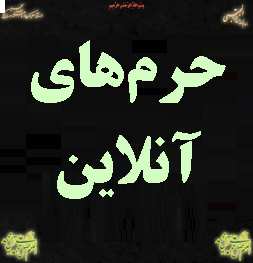

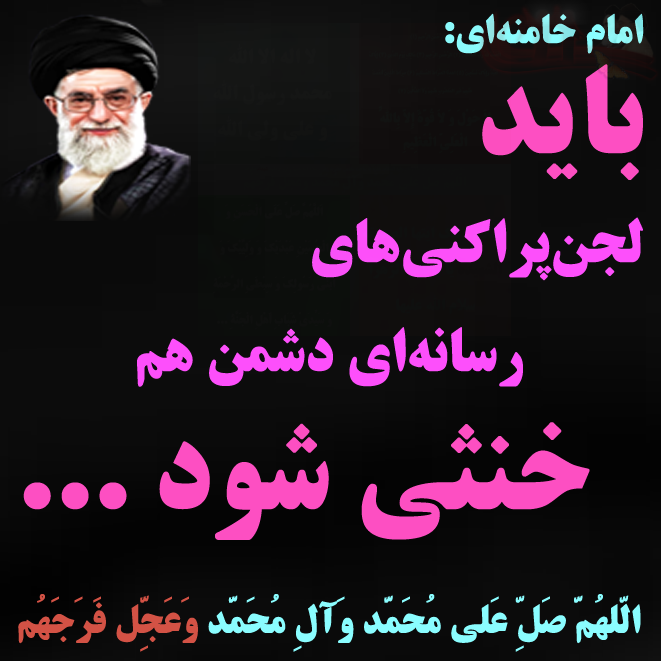
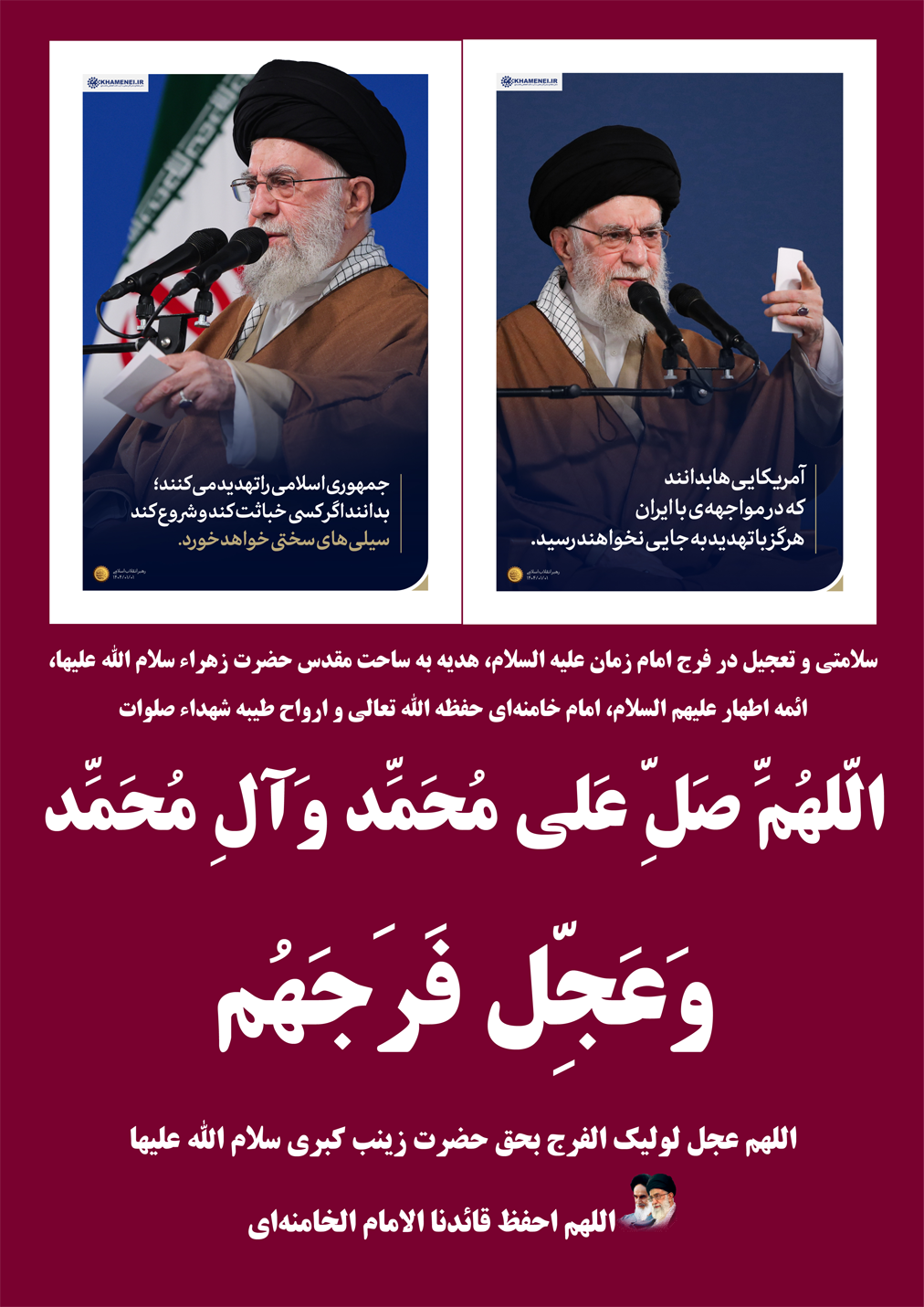










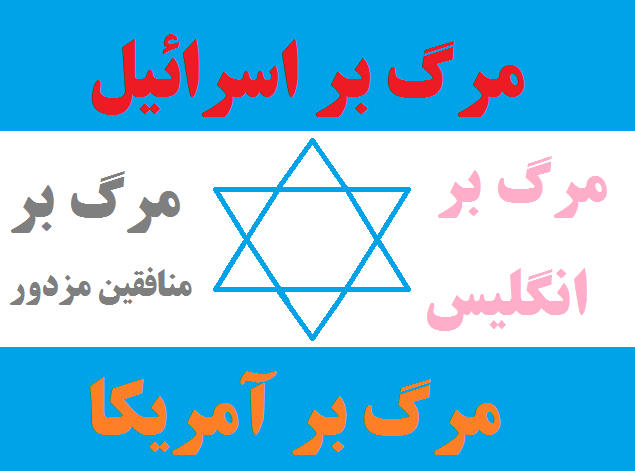


https://www.mizanonline.ir/fa/news/596200
https://harimeharam.ir/shahid/127
حضرت آیتالله امام خامنهای:
ارزش شهدای ما هم باید معلوم باشد. شهدای دفاع از حرم اگر نبودند، ما باید حالا با عناصر فتنهگرِ خبیثِ دشمنِ اهلبیت و دشمن مردم شیعه، در شهرهای ایران میجنگیدیم ...
شهید سپهبد حاج قاسم سلیمانی:
از اصول مراقبت کنید. اصول یعنی ولیّفقیه، خصوصاً این حکیم، مظلوم، وارسته در دین، فقه، عرفان، معرفت؛ خامنهای عزیز را عزیزِ جان خود بدانید. حرمت او را حرمتِ مقدسات بدانید ...

بخشی از وصیتنامه شهید مدافع حرم شهید مرتضی کریمی
(ابوحنانه):
سلام درود به ساحت مقدس امام زمان عج و روح پاك امام راحل و سلام بر نائب بر حقش حضرت سيد علي خامنهاي مدظله العالي و شهداي هشت سال دفاع و شهداي مدافع حرم.
از تمامي دوستان و آشنايان و خانواده خودم تقاضا دارم به فرامين مقام معظم رهبري گوش فرا دهند تاگمراه نشوند زيرا ايشان بهترين دوست شناس و دشمن شناس است ...

https://harimeharam.ir/shahid/114
بخشی از وصیتنامه شهید مدافع حرم شهید محمد تاجبخش:
با خدا باشید تا خدا با شما باشد. و همیشه کمک به فقرا و مستمندان را فراموش نکنید و در ایام محرم و گرفتن مراسم عزاداری، روضه خوانی برای سالار شهیدان کوتاهی نفرمایید. در کارهای خیرخواهانه و مراسم های مذهبی شرکت کنید. همیشه ختم قرآن در منزل برقرار کنید و از قرآن و نماز فاصله نگیرید. وصیت من به فرزندانم این است که حجاب زینبی را سرلوحه زندگی خود قرار دهید و در آخر از خداوند متعال برای سلامتی آقا امام زمان (عج) و ظهور هرچه سریعتر آقایمان دعا کنید ...

دستنوشته شهید مدافع حرم شهید محمد پورهنگ درباره علت عزیمت به سوریه:
یک روز صبح که برای نماز صبح بیدار شدم، بعد از نماز خواندن، بدون آنکه همسر عزیزم بفهمد، به بی غیرتی خویش گریه کردم. چرا که داعش کثیف و حرامزاده به حرم دختر علی(ع) حمله کرده بود و من بی غیرت به راحتی خوابیده بودم و خیلی از امیرالمومنین خجالت کشیدم و از ایشان خواستم که مرا به سوریه ببرد تا من فدای دختر عزیز ایشان شوم. که الحمدلله این امر برای من مهیا شد و من به سوریه رسیدم.
بعد که به زیارت ایشان مشرف شدم، حال عجیبی داشتم. فهمیدم که عنایت خاص به من شده است و خواستم که من و تمام اعضای خانواده ام فدای ایشان شویم که ان شاالله این اتفاق خواهد افتاد.
در حرم حضرت رقیه (س) احساس خاصی داشتم، ناخودآگاه یاد حضرت زهرا (س) افتادم...

https://harimeharam.ir/shahid/125
همسر شهید مدافع حرم شهید حجت الاسلام جابر حسین پور (زهیری):
شهید نوشته بودند که از فراق من ناراحت نشوید. من جای خوبی رفتهام. تمام سعیت را بکن که فرزندانمان را در راه خدا و حضرت زینب (س) بزرگ بکنی که این بزرگترین جهاد تو است. مراقب خودت باش و نگذار دشمن از گریههای تو خشنود شود.
وی در پایان با اشاره به ادامه دادن راه شهید گفت: راه شهدا را میتوان با حفظ حجاب تن و حفظ حجاب چشم و پیروی از رهبر و حفظ اسلام ادامه داد و اینکه نگذاریم دشمن در بینمان فتنه کند.
وی در پاسخ به گستاخیهای دشمنان انقلاب گفت: اگر دشمن فقط فکر هجوم به کشور عزیزمان را داشته باشد از جان ناقابلمان دریغ نکنیم و در مقابل او بایستیم.
داستان زندگی مردی که به همهی تعلقات دنیا پشت پا زد ...
برای یتیمان و مظلومانگریه میکرد (حدیث دشت عشق)

بخشی از وصیتنامه شهید مدافع حرم شهید مهدی محمدی مفرد (ابوفاضل)
مسیر انتخاب شده شاید کمی ناهموار باشد برای بعضی از انسانهای عافیتطلب غیرقابل توجیه باشد اما گاهی انسانها باید بروند تا مسیر حق طلبی زنده بماند و اگر نباشد تداوم این مسیر شاید صدای حق دیر گاهی بود که خاموش شده بود و این ندا که از ابتدای خلقت در جهان توسط پیامبران و امامان همیشه به شیوههای مختلف و با یک هدف بلند بوده است امروز توسط نایب برحق امام زمان(عج) برای ما اعلام و وظیفه ماست که به هرصورت ممکن این ندا را لبیک و فراتر نموده تا گوش جهانخواران و عافیت طلبهای بیدرد که انشاءالله وصل به قیام حضرت مهدی(عج) خواهد شد.
بیشک ما نه جنگ طلب هستیم و نه به دور ازجامعه ولی گوش به فرمان ولی تا پای جان ایستادگی خواهیم کرد و باشد تا آرزوی شهادت ما محقق گردد...



_gbjl.gif)

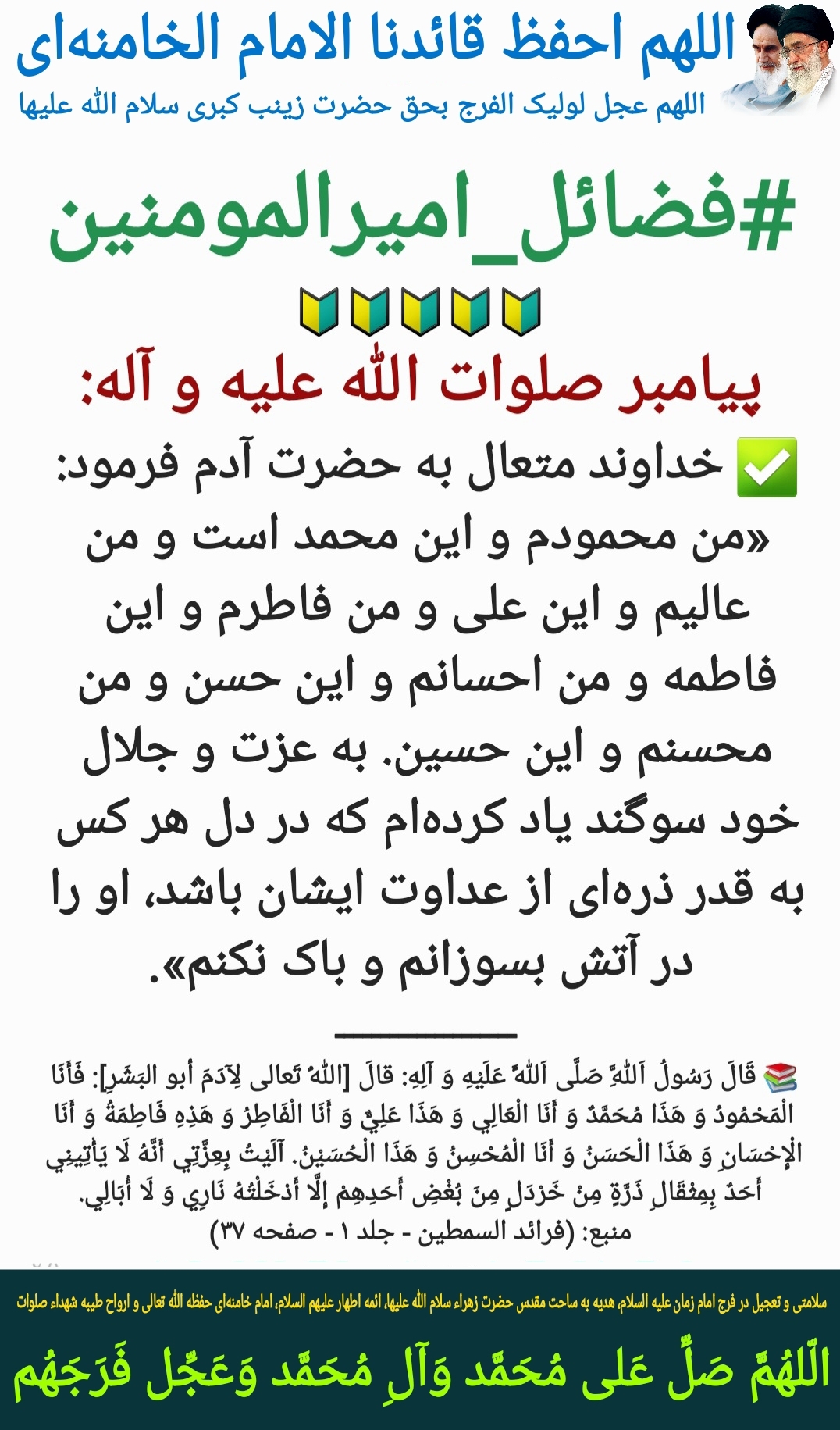 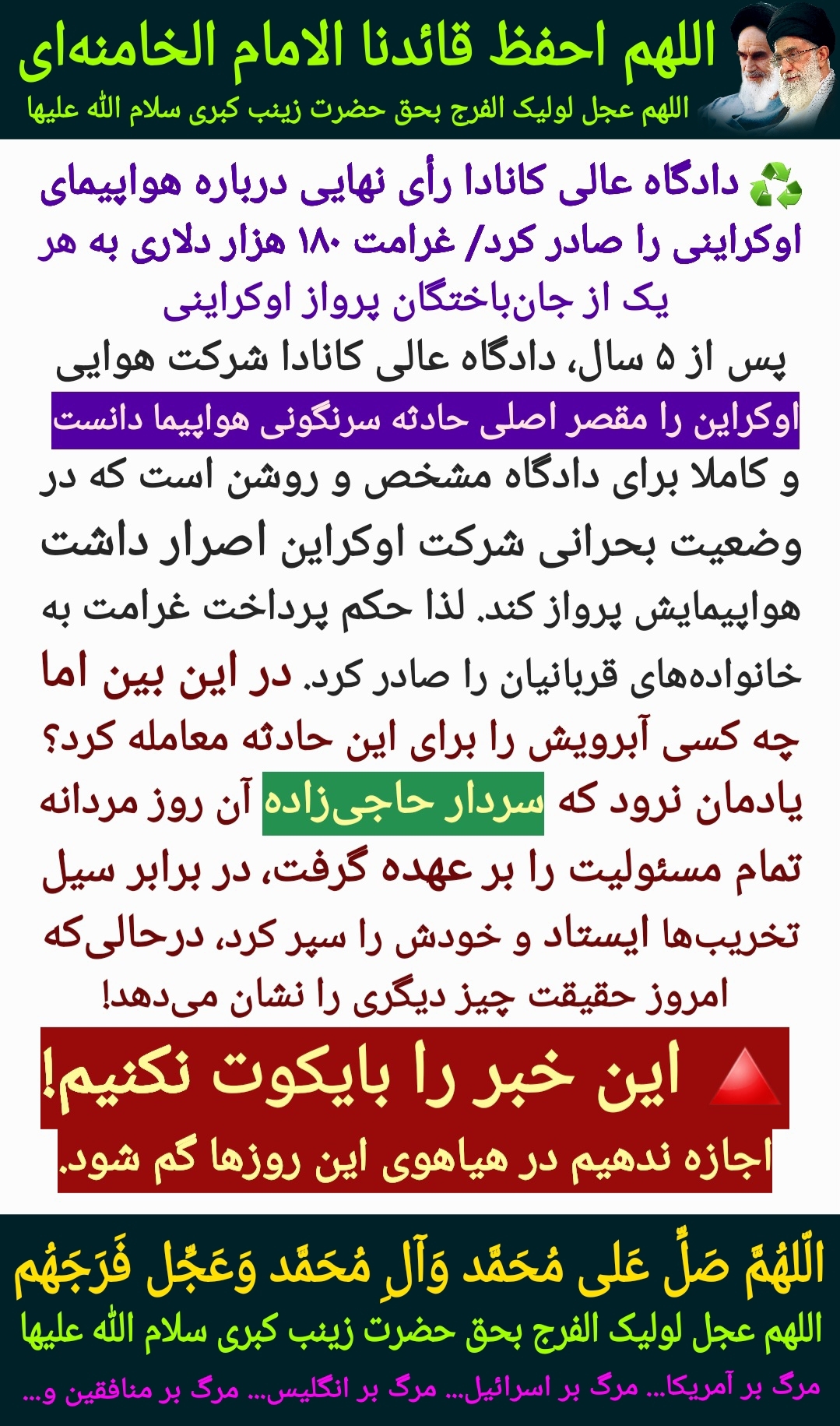


_gbjl.gif)
کانال فضیلتها | کانال طاووس الجَنَّه | کانال شَرحِ سِرّ ( تماشاگه راز)
پایگاه اطلاعرسانی سید ابراهیم رئیسی:
https://raisi.ir/
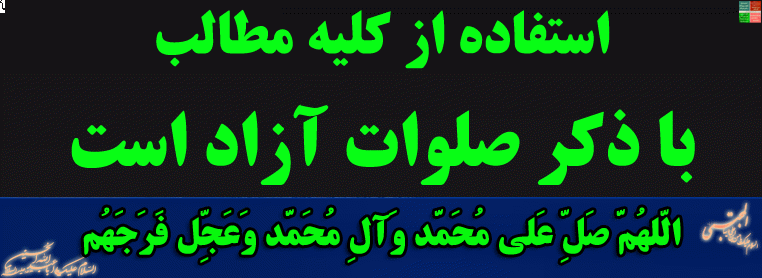
الّلهُمَّ صَلِّ عَلَی مُحَمَّدٍ وَ آلِ مُحَمَّدٍ و عَجّل فَرَجَهم
*****
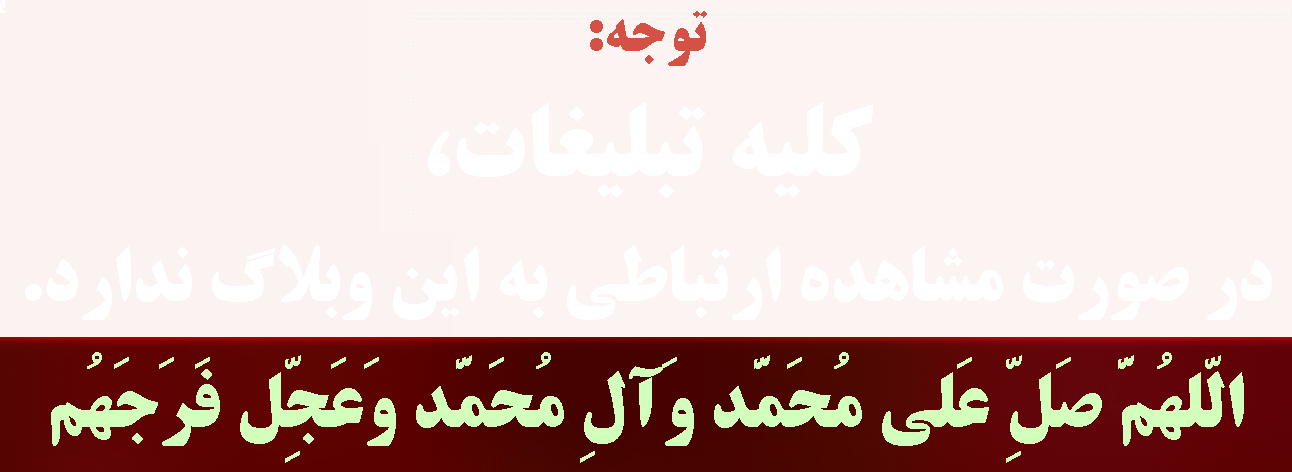
التماس دعا
:: موضوعات مرتبط:
ولایت فقیه ,
شهید ,
شهداء مدافع حرم ,
مسئله مهدویت ,
ظهور ,
حجاب ,
,
:: برچسبها:
شهدای دفاع از حرم ,
شهرهای ایران ,
شهید سپهبد حاج قاسم سلیمانی ,
از اصول مراقبت کنید ,
شهید مدافع حرم ,
شهید مرتضی کریمی ,
شهید محمد تاجبخش ,
حجاب زینبی ,
حجاب ,
زینبی ,
شهید محمد پورهنگ ,
حضرت رقیه (س) ,
حرم حضرت رقیه (س) ,
شهید حجت الاسلام جابر حسین پور ,
پیروی از رهبر ,
شهید مهدی محمدی مفرد ,
گوش به فرمان ولی ,
تا پای جان ایستادگی خواهیم کرد ,
یا زهرا سلام الله علیها ,
ظهور ,
امام خامنه ای ,
|
امتیاز مطلب : 44
|
تعداد امتیازدهندگان : 12
|
مجموع امتیاز : 12
|
نویسنده : yamahdi788
تاریخ : دو شنبه 25 فروردين 1404
|
New Page 1
بِسْمِ اللَّهِ الرَّحْمَنِ الرَّحِیمِ
اَلسَّلامُ عَلَیکمْ یا اَهْلَ بَیتِ النُّبُوَّة
السلام علیک یا فاطمه الزهرا یا صدیقه الشهیده (سلام الله علیها)

https://erfan.ir/mafatih204
بخشی از زیارتنامه حضرت حمزة بن عبدالمطلب علیه السلام:
السَّلاَمُ عَلَيْكَ يَا عَمَّ رَسُولِ اللَّهِ صَلَّى اللَّهُ عَلَيْهِ وَ آلِهِ
السَّلاَمُ عَلَيْكَ يَا خَيْرَ الشُّهَدَاءِ
السَّلاَمُ عَلَيْكَ يَا أَسَدَ اللَّهِ وَ أَسَدَ رَسُولِهِ
أَشْهَدُ أَنَّكَ قَدْ جَاهَدْتَ فِي اللَّهِ عَزَّ وَ جَلَّ
وَ جُدْتَ بِنَفْسِكَ وَ نَصَحْتَ رَسُولَ اللَّهِ صلى الله عليه و آله
وَ كُنْتَ فِيمَا عِنْدَ اللَّهِ سُبْحَانَهُ رَاغِباً بِأَبِي أَنْتَ وَ أُمِّي ...
سلام بر تو ای عموی رسول خدا (درود خدا بر او و خاندانش باد)، سلام بر تو ای بهترین شهیدان، سلام بر تو ای شیر خدا و شیر رسول خدا، گواهی میدهم که تو در راه خدای عزّوجل جهاد کردی و جانت را بخشیدی و برای رسول خدا خیرخواهی نمودی و در آنچه نزد خدای پاک بود شوق داشتی، پدر و مادرم فدایت ...
حضرت حمزه سیدالشهداء / عموی پیامبر / حمزة بن ابیطالب
درس جنگ اُحد برای همه دورانها

ویژه نامه شیر خدا و رسول (به مناسبت سال روز شهادت حضرت حمزة بن عبدالمطلب علیه السلام)
سالروز شهادت حضرت حمزه سيد الشهداء (ع) ، در جنگ احد (3 قمری)

حضرت عبدالعظیم حسنی(علیهالسلام) / شهر ری / سیدالکریم/شاهعبدالعظیم
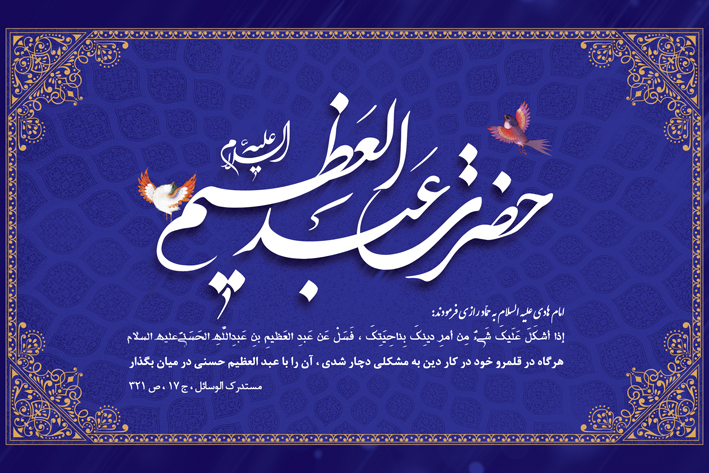

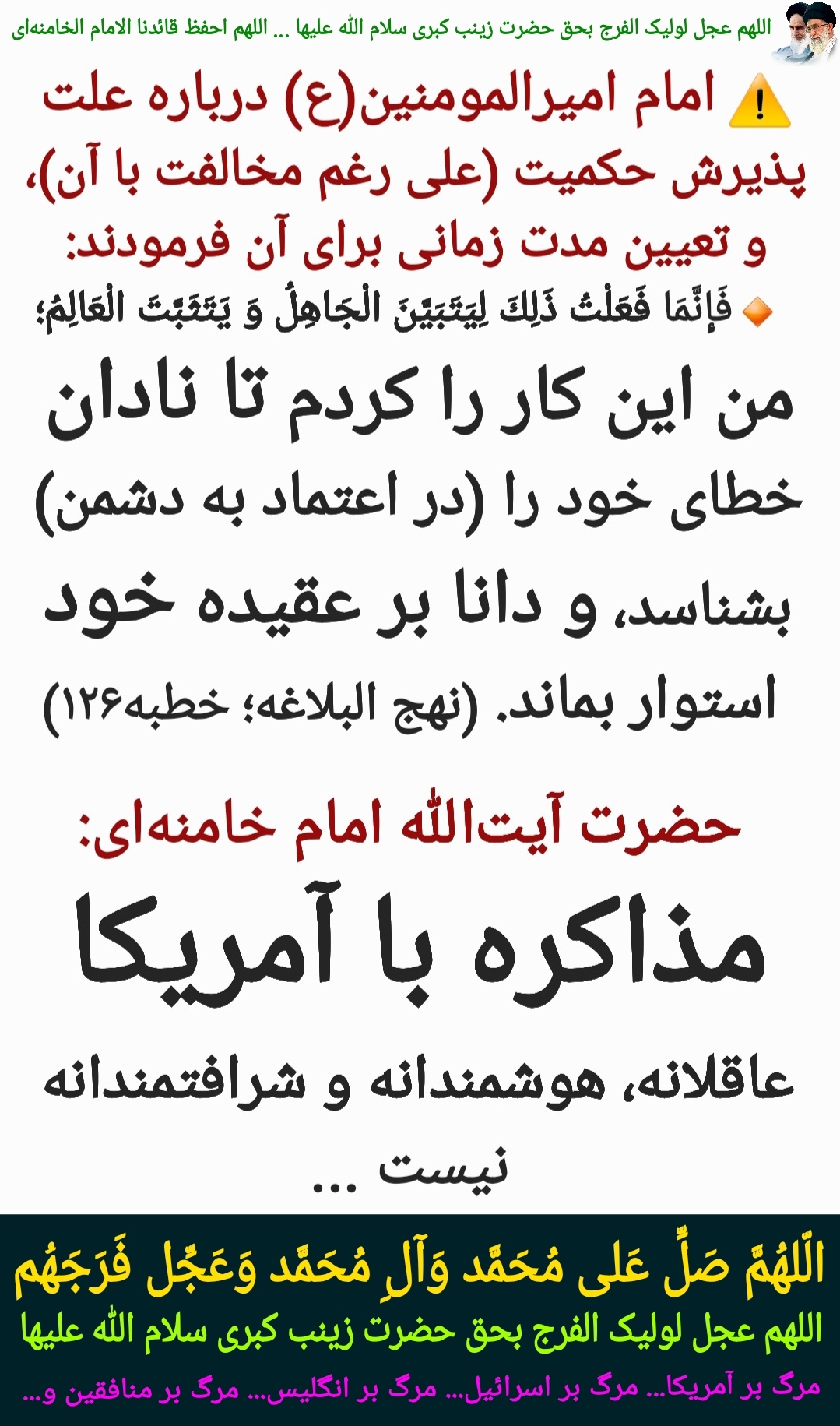
الّلهُمَّ صَلِّ عَلی مُحَمَّد وَآلِ مُحَمَّد وَعَجِّل فَرَجَهُم
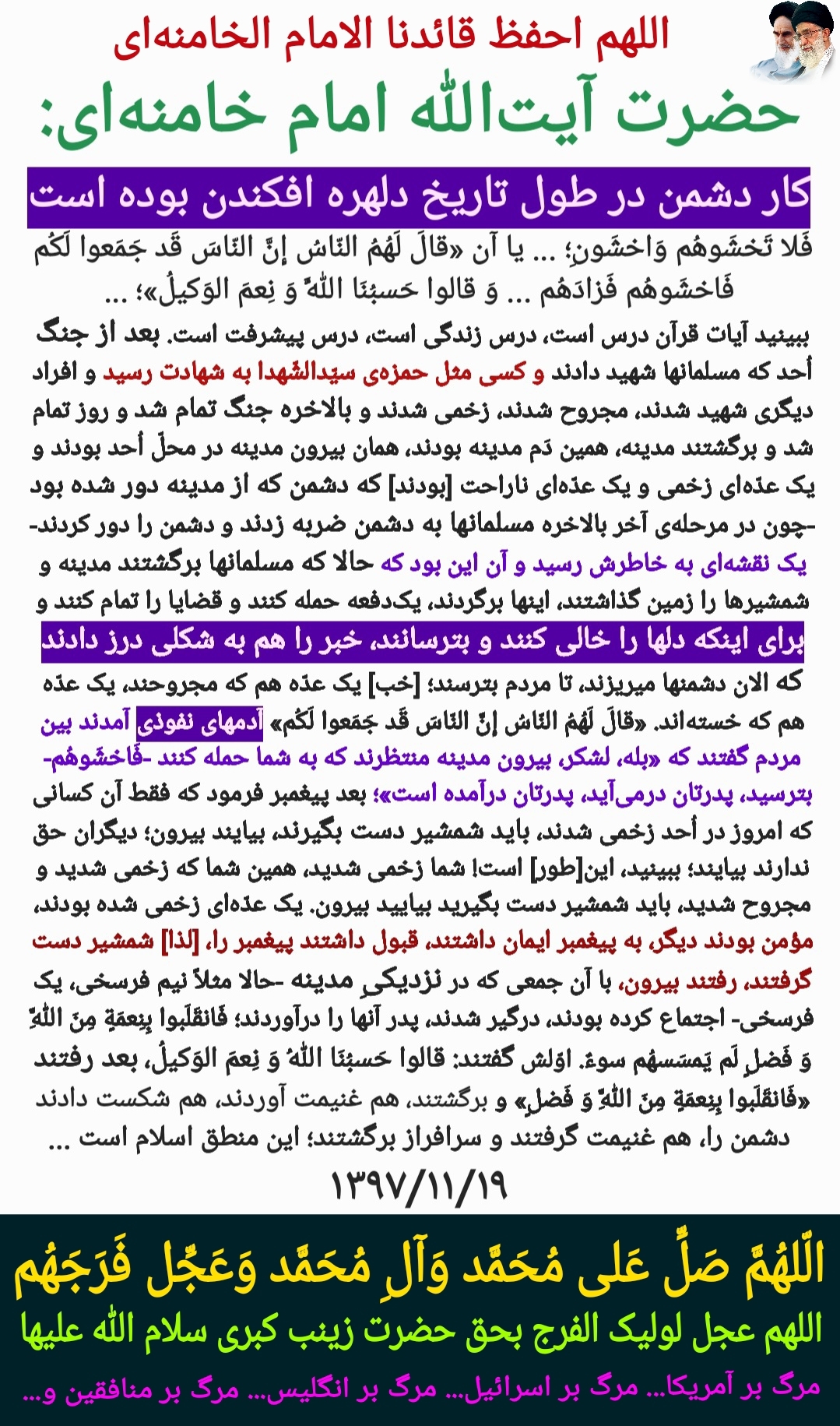
الّلهُمَّ صَلِّ عَلی مُحَمَّد وَآلِ مُحَمَّد وَعَجِّل فَرَجَهُم
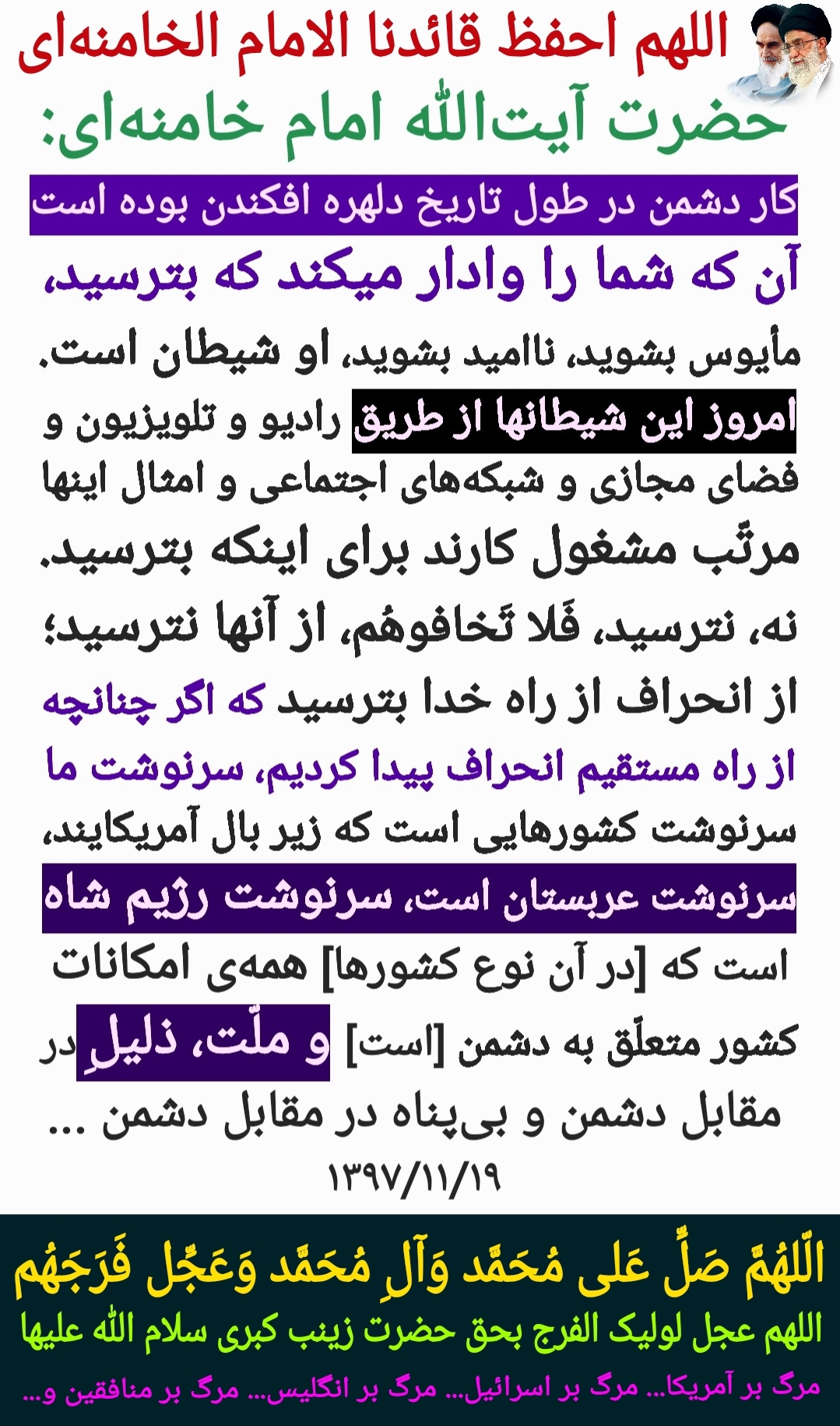
الّلهُمَّ صَلِّ عَلی مُحَمَّد وَآلِ مُحَمَّد وَعَجِّل فَرَجَهُم
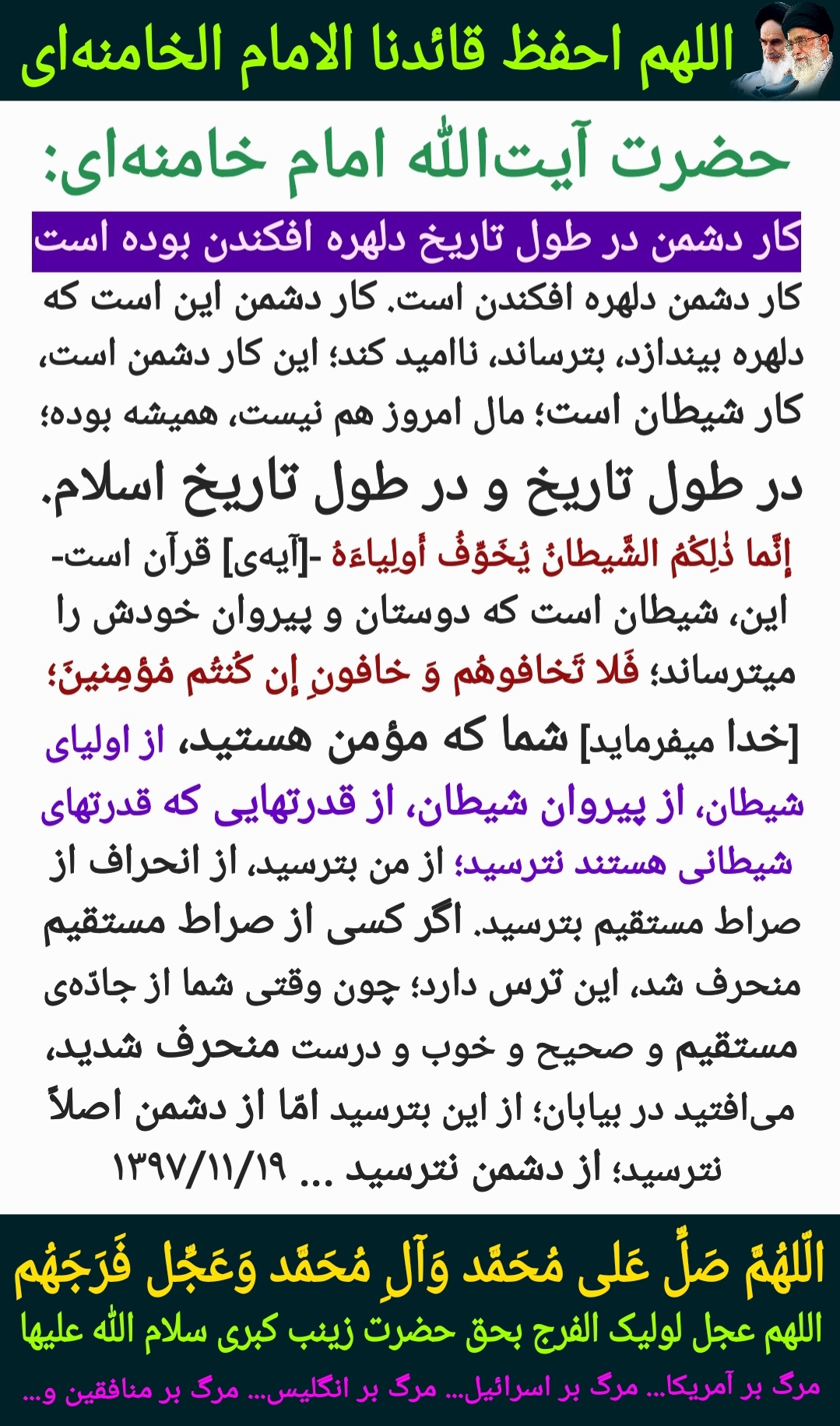
امام خامنهای:
آن که شما را وادار میکند که بترسید، مأیوس بشوید، ناامید بشوید، او شیطان است. امروز این شیطانها از طریق رادیو و تلویزیون و فضای مجازی و شبکههای اجتماعی و امثال اینها مرتّب مشغول کارند برای اینکه بترسید. نه، نترسید، فَلا تَخافوهُم، از آنها نترسید؛ از انحراف از راه خدا بترسید که اگر چنانچه از راه مستقیم انحراف پیدا کردیم، سرنوشت ما سرنوشت کشورهایی است که زیر بال آمریکایند، سرنوشت عربستان است، سرنوشت رژیم شاه است که [در آن نوع کشورها] همهی امکانات کشور متعلّق به دشمن [است] و ملّت، ذلیلِ در مقابل دشمن و بیپناه در مقابل دشمن.۱۳۹۷/۱۱/۱۹
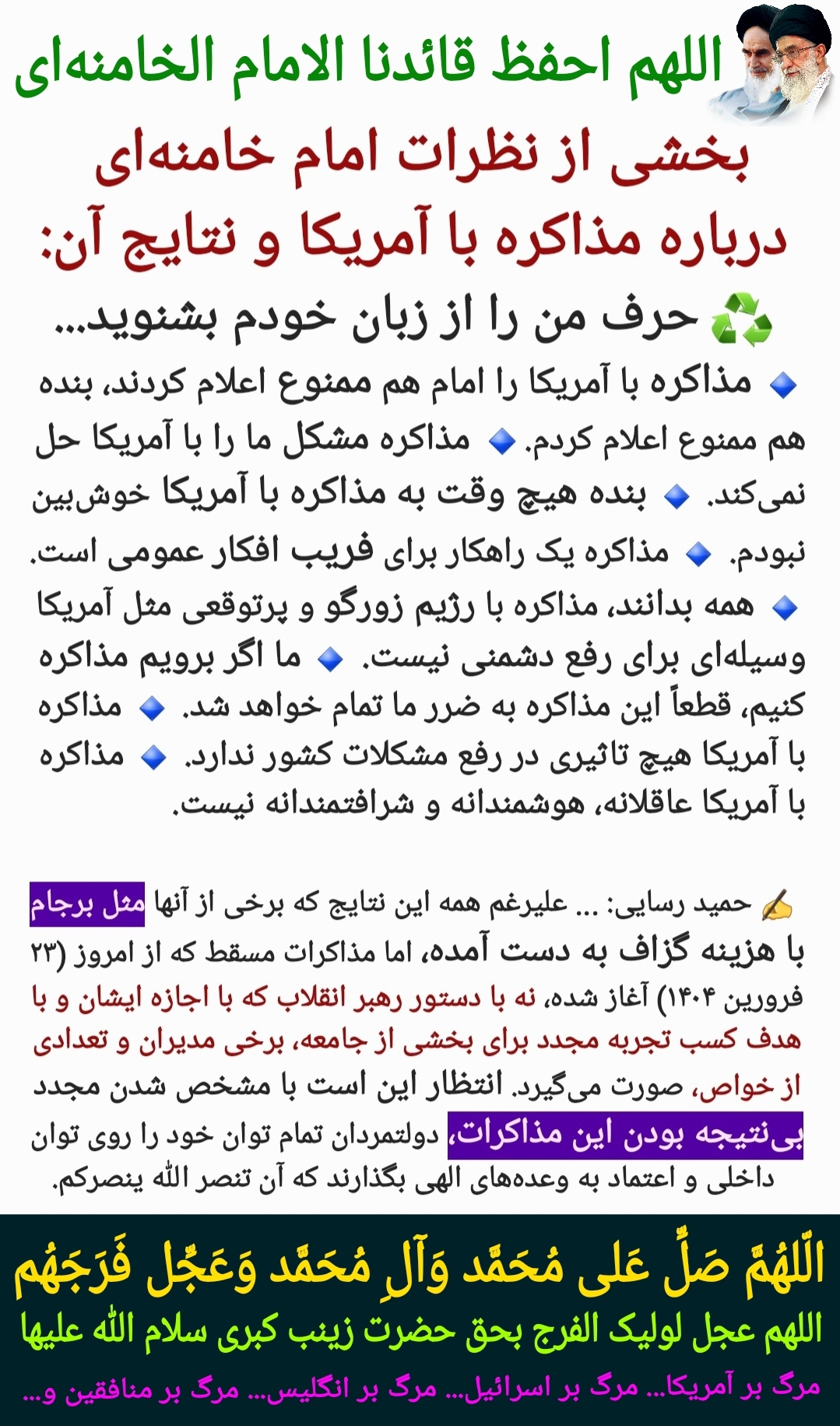
الّلهُمَّ صَلِّ عَلی مُحَمَّد وَآلِ مُحَمَّد وَعَجِّل فَرَجَهُم
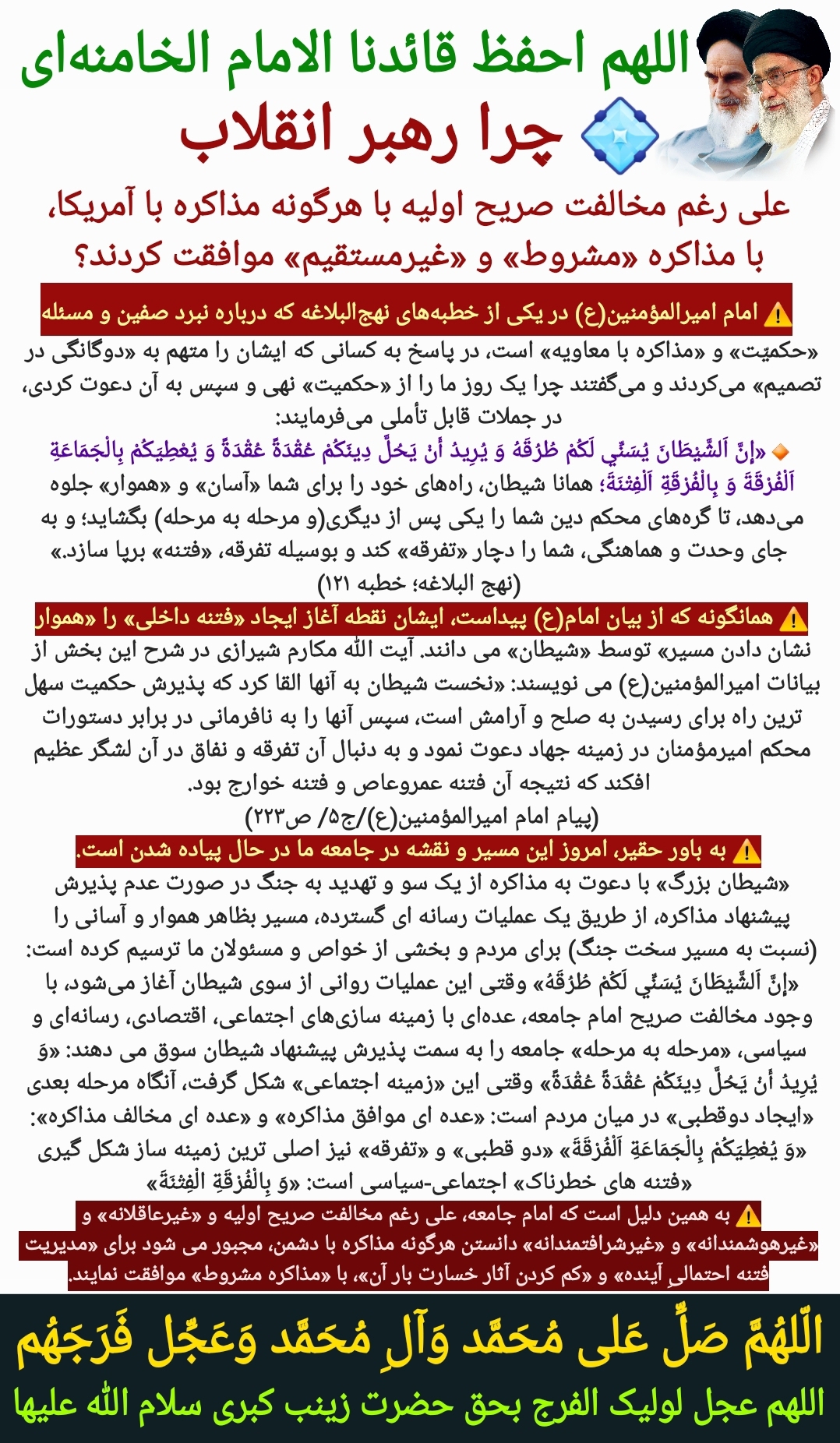
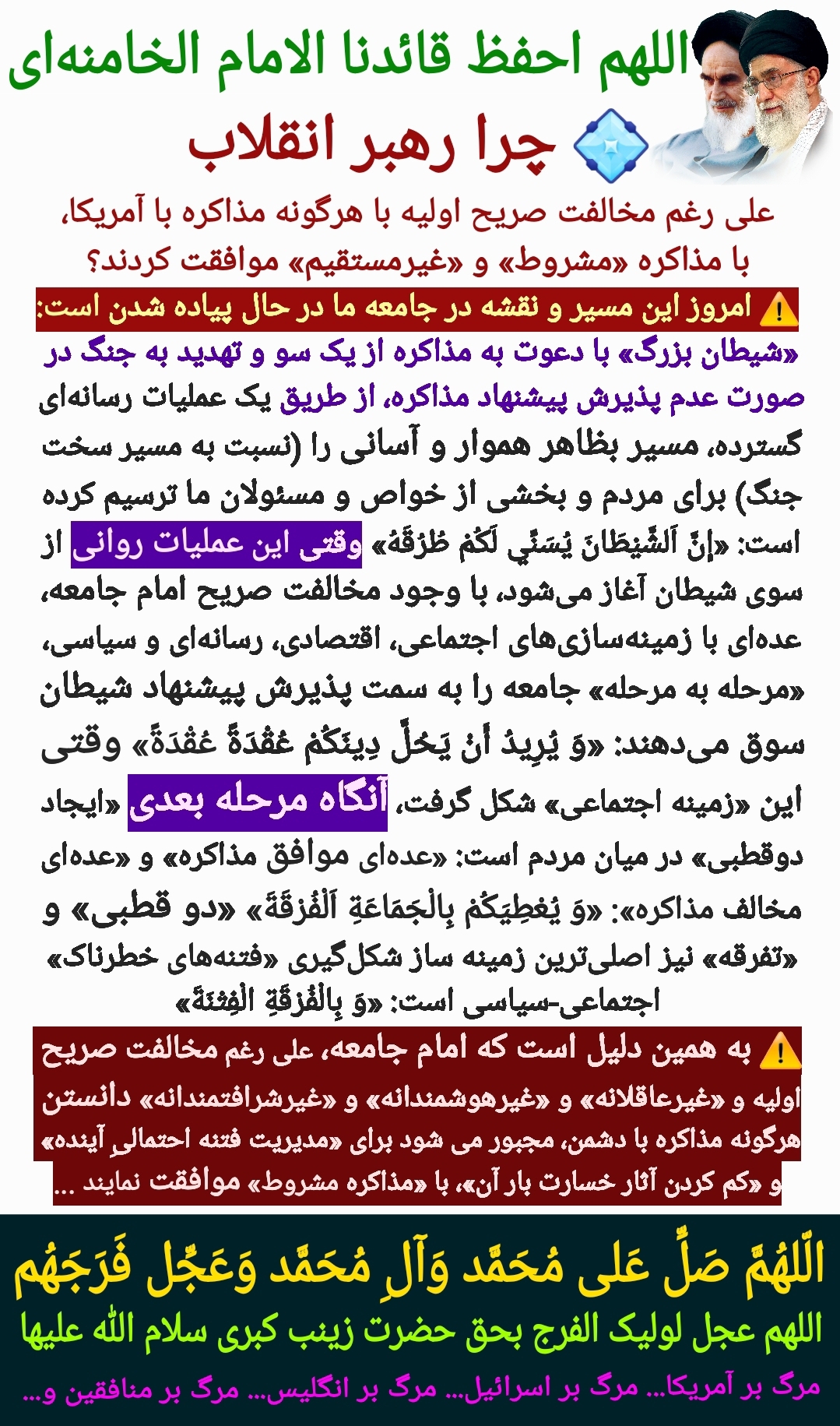
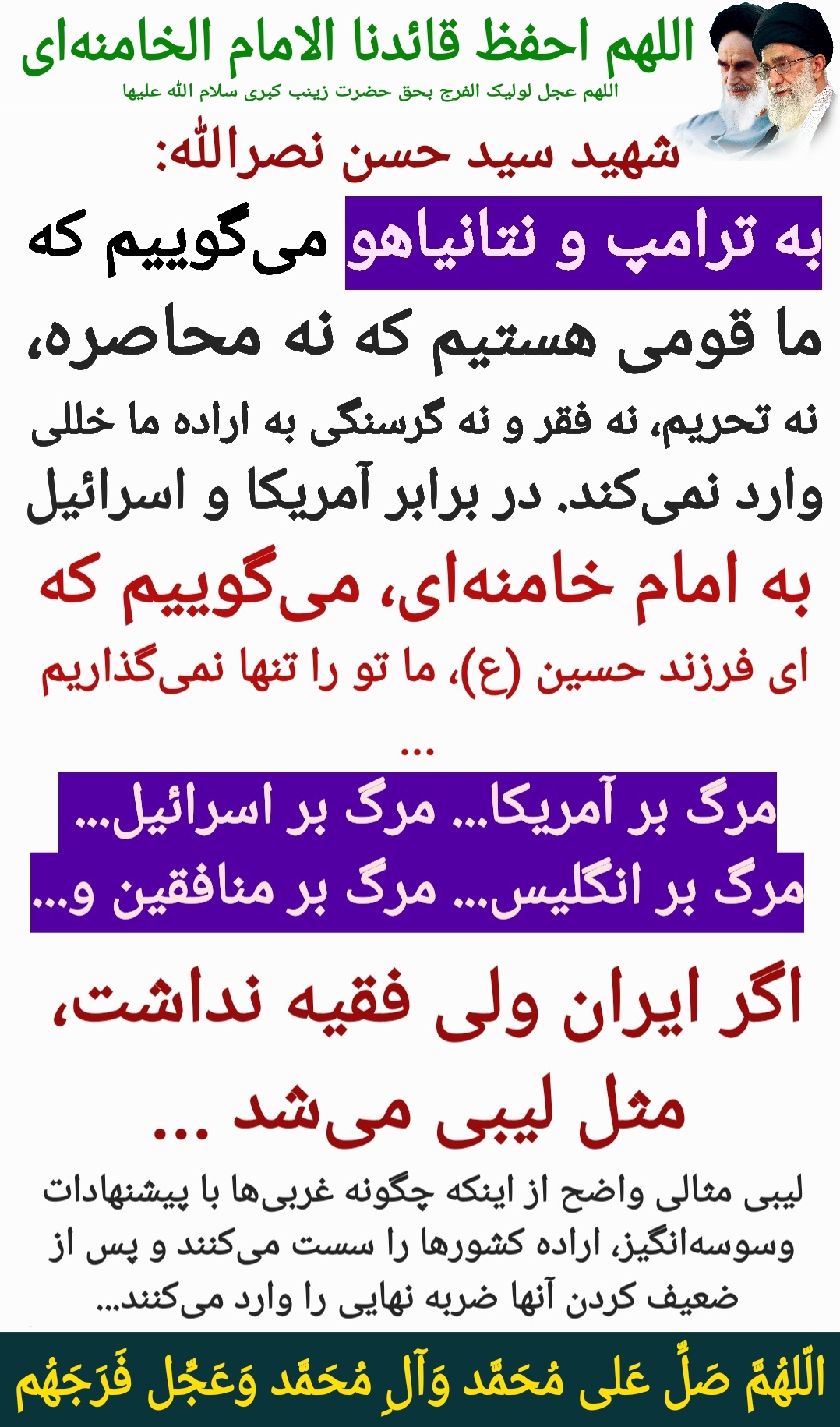
الّلهُمَّ صَلِّ عَلی مُحَمَّد وَآلِ مُحَمَّد وَعَجِّل فَرَجَهُم
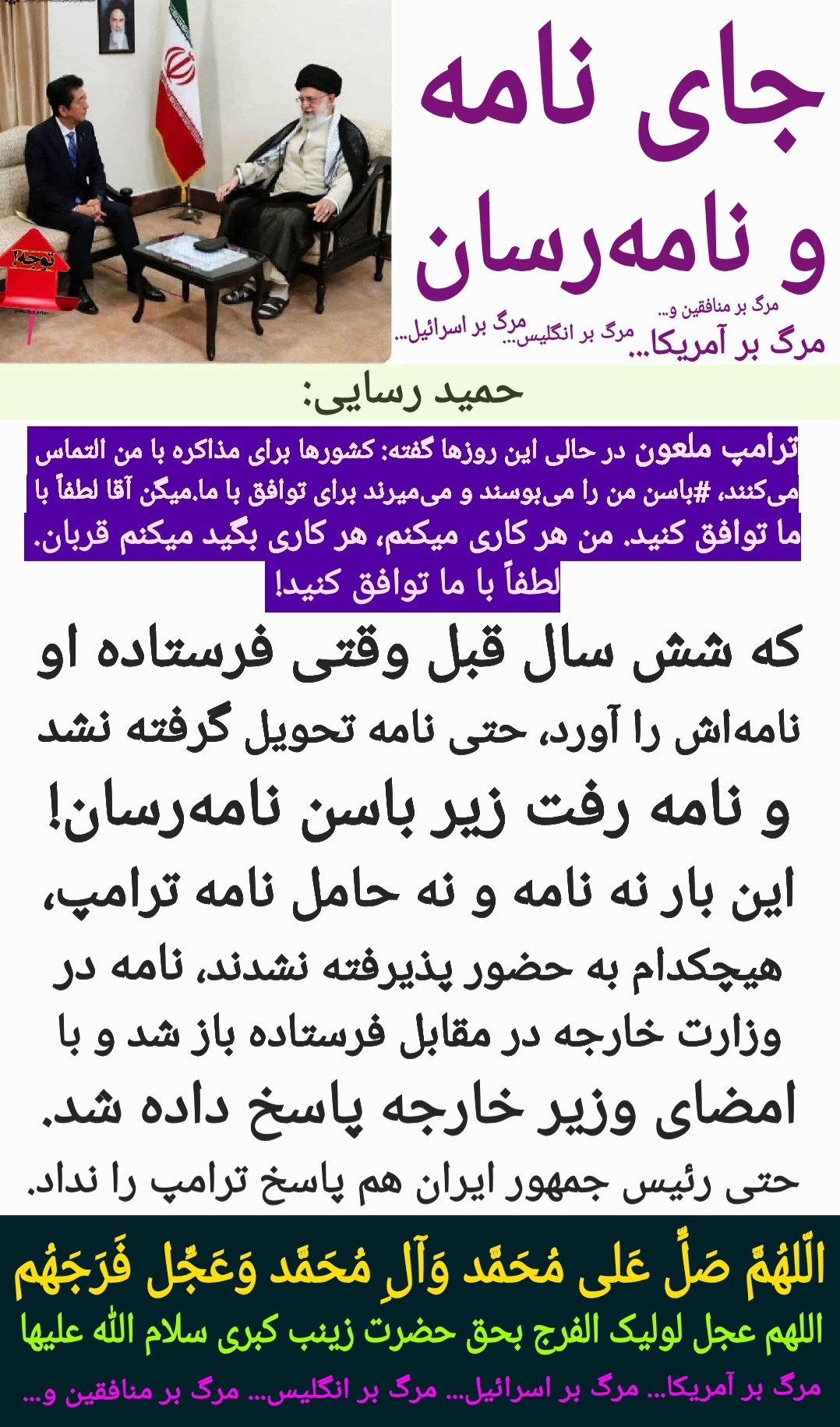
الّلهُمَّ صَلِّ عَلی مُحَمَّد وَآلِ مُحَمَّد وَعَجِّل فَرَجَهُم
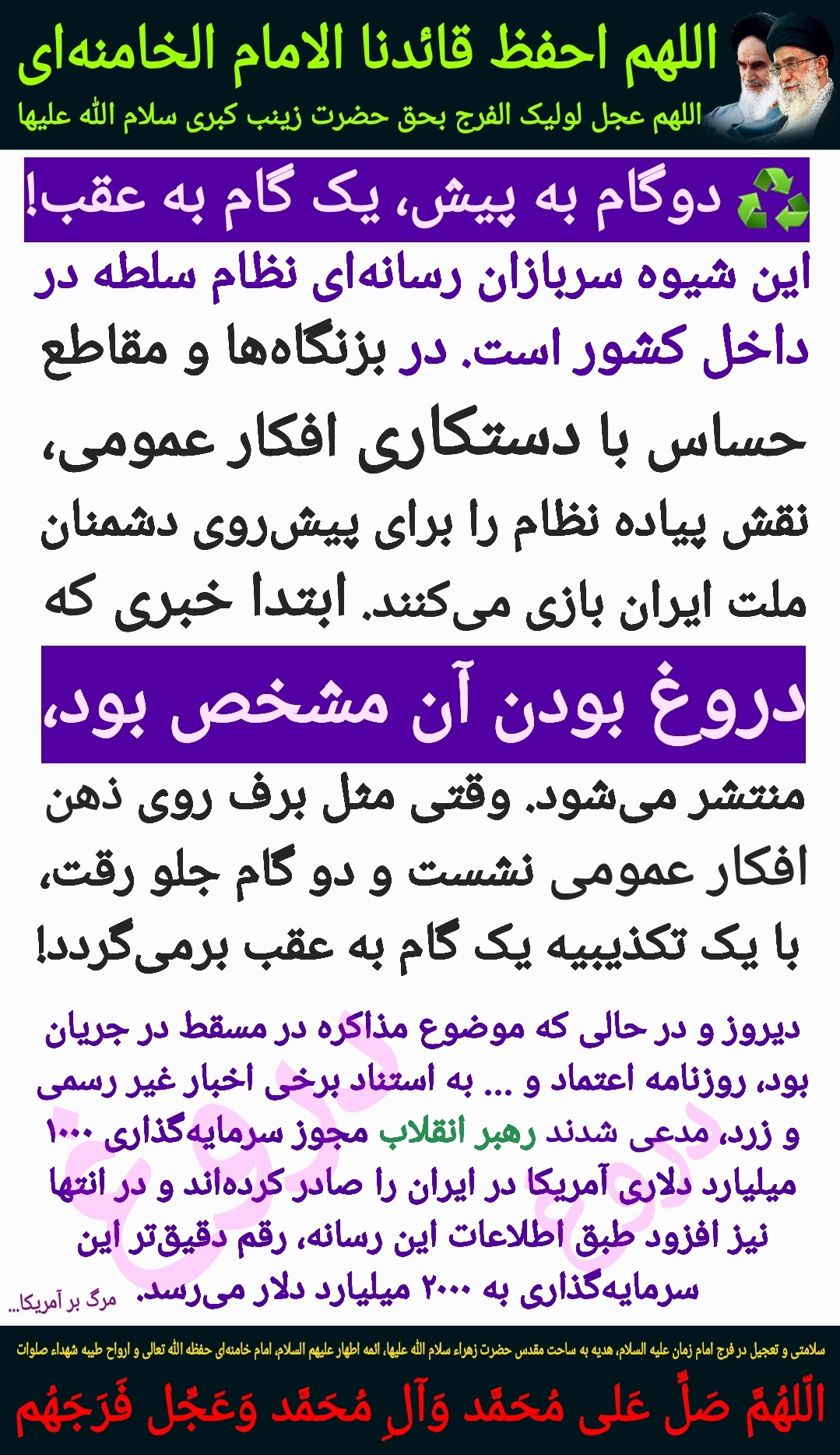
برخی پیوندهای مفید:
http://islamicworld.ir/fa/
به یاد شهداء
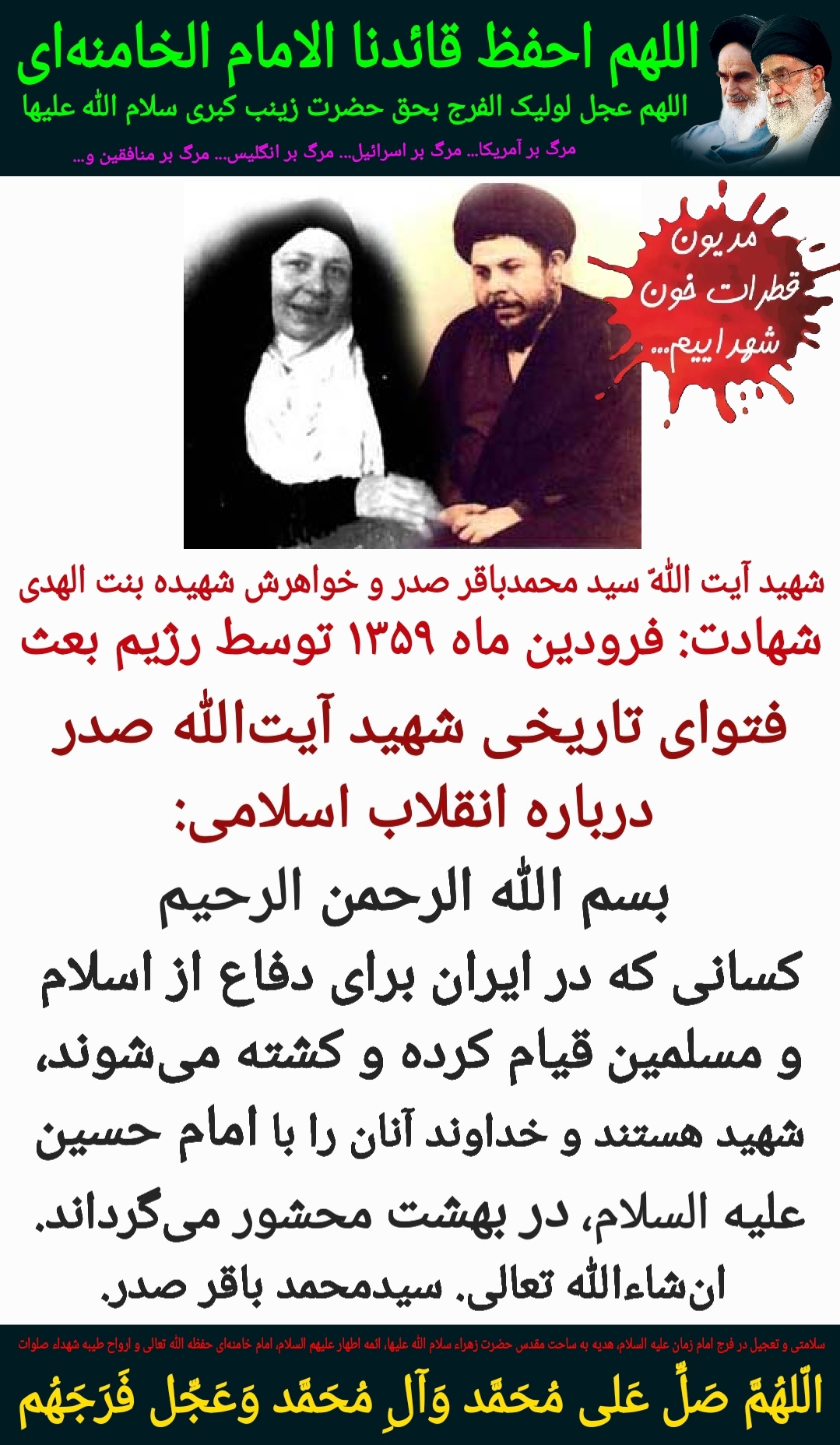
الّلهُمَّ صَلِّ عَلی مُحَمَّد وَآلِ مُحَمَّد وَعَجِّل فَرَجَهُم
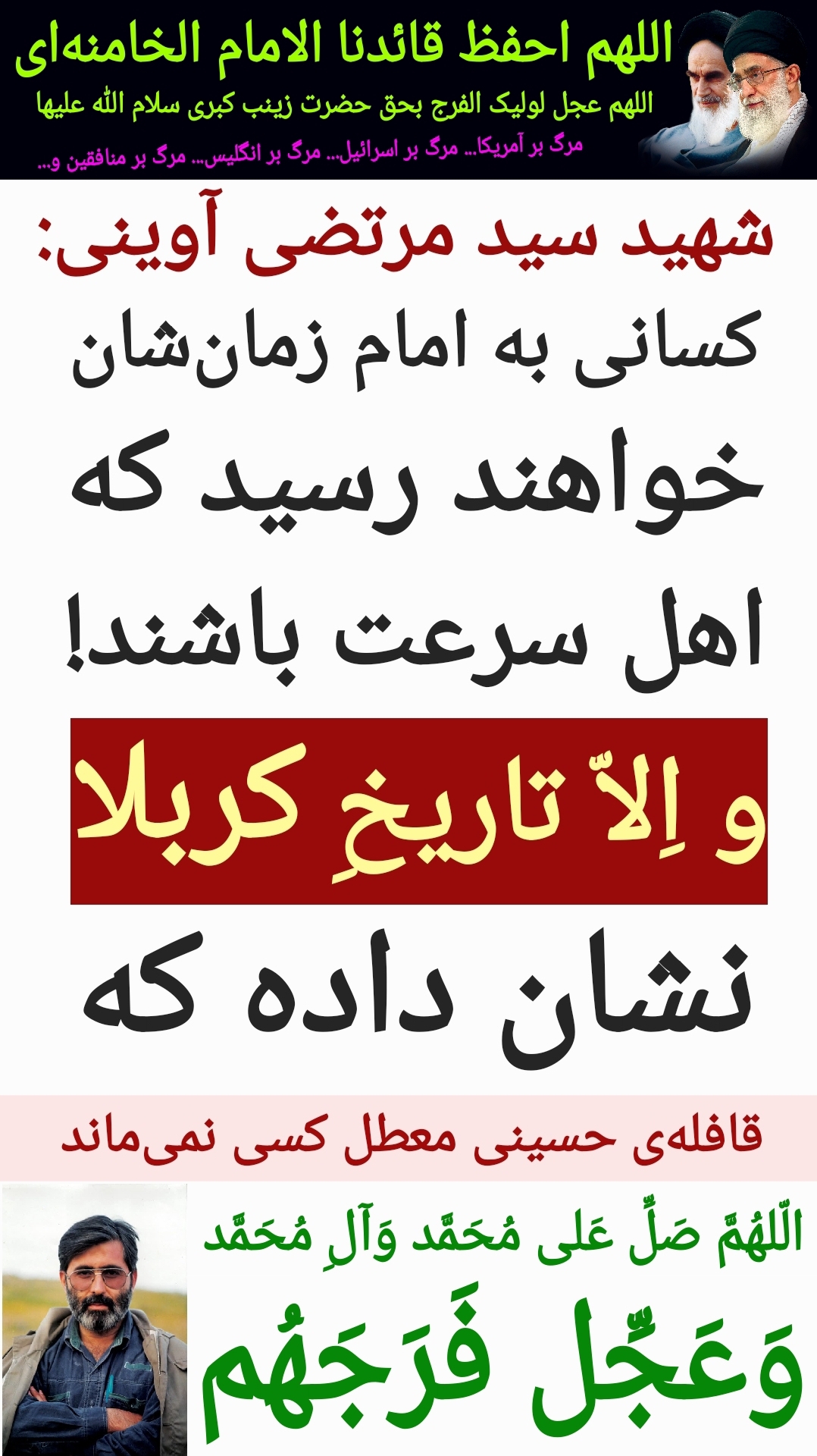
الّلهُمَّ صَلِّ عَلی مُحَمَّد وَآلِ مُحَمَّد وَعَجِّل فَرَجَهُم
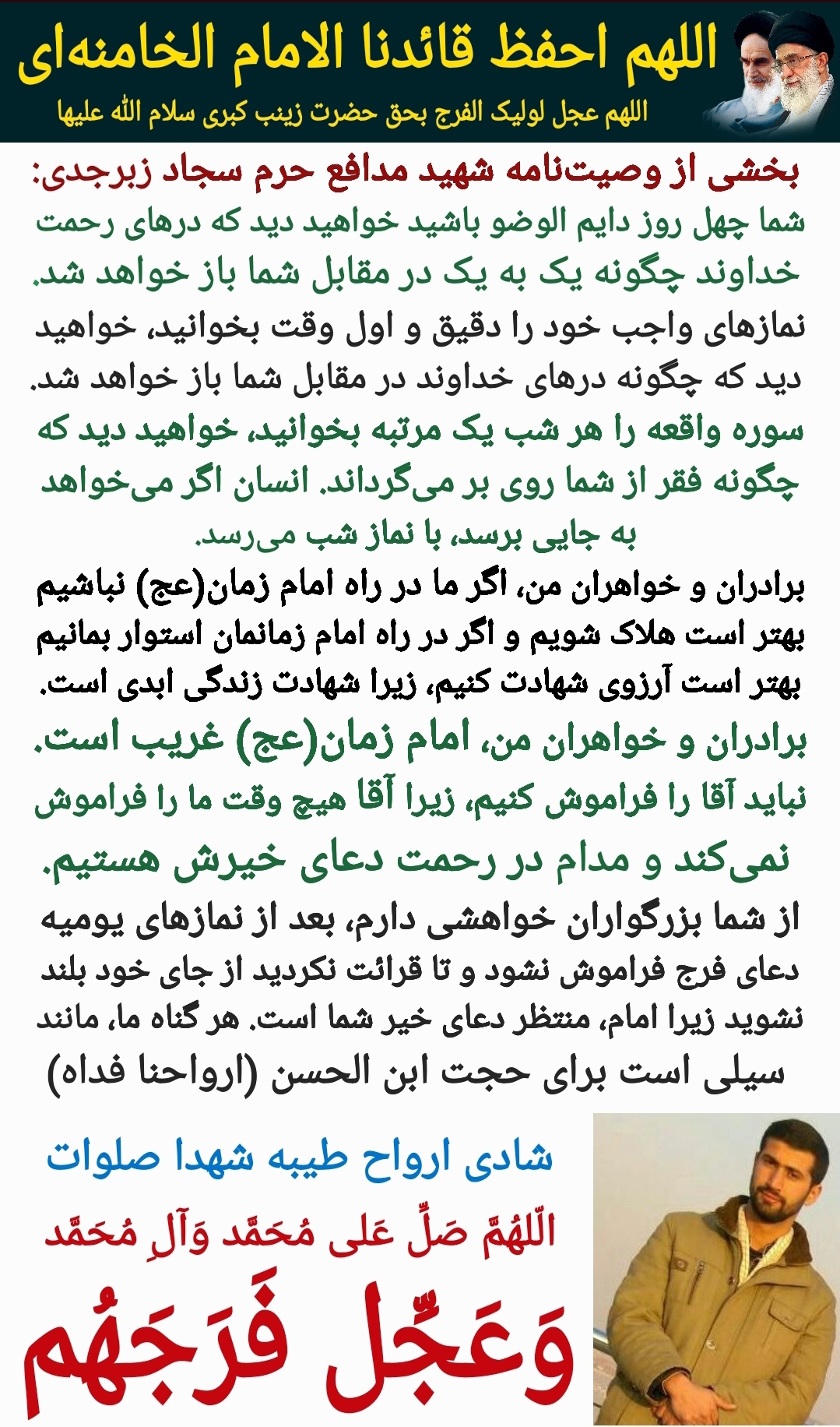
الّلهُمَّ صَلِّ عَلی مُحَمَّد وَآلِ مُحَمَّد وَعَجِّل فَرَجَهُم
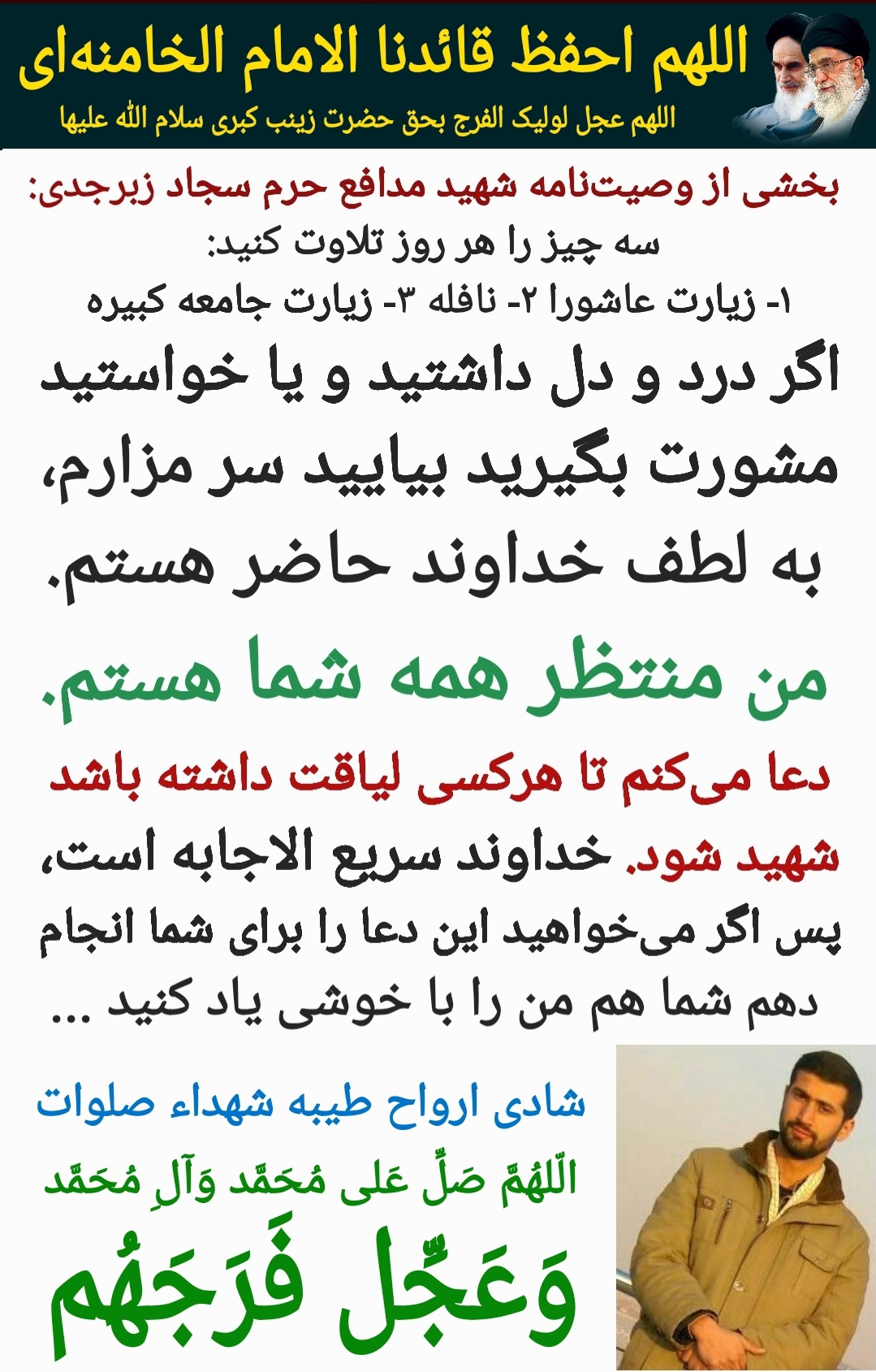
استفاده از کلیه مطالب با ذکر صلوات آزاد است
سلامتی و تعجیل در فرج امام زمان علیه السلام، هدیه به ساحت مقدس حضرت زهراء سلام الله علیها، ائمه اطهار علیهم السلام، امام خامنه ای حفظه الله تعالی و ارواح طیبه شهداء صلوات
الّلهُمَّ صَلِّ عَلی مُحَمَّد وَآلِ مُحَمَّد وَعَجِّل فَرَجَهُم
:: موضوعات مرتبط:
ولایت فقیه ,
شهید ,
دفاع مقدس ,
شهداء مدافع حرم ,
مسئله مهدویت ,
ظهور ,
انتخابات ,
احادیث ائمه اطهار (علیهم السلام) ,
شهدای کربلا ,
,
:: برچسبها:
حضرت حمزه سیدالشهداء ,
عموی پیامبر ,
حمزة بن ابیطالب ,
درس جنگ اُحد برای همه دورانها ,
حضرت حمزه سيد الشهداء (ع) ,
حضرت عبدالعظیم حسنی(علیهالسلام) ,
شهر ری ,
سیدالکریم ,
شاهعبدالعظیم ,
الّلهُمَّ صَلِّ عَلی مُحَمَّد وَآلِ مُحَمَّد وَعَجِّل فَرَجَهُم ,
شیطان ,
رادیو ,
تلویزیون ,
فضای مجازی ,
شبکههای اجتماعی ,
ترس ,
یا زهرا سلام الله علیها ,
ظهور ,
امام خامنه ای ,
|
امتیاز مطلب : 20
|
تعداد امتیازدهندگان : 8
|
مجموع امتیاز : 8
|
نویسنده : yamahdi788
تاریخ : پنج شنبه 21 فروردين 1404
|
بِسْمِ اللَّهِ الرَّحْمَنِ الرَّحِیمِ
اَلسَّلامُ عَلَیکمْ یا اَهْلَ بَیتِ النُّبُوَّة
السلام علیک یا فاطمه الزهرا یا صدیقه الشهیده (سلام الله علیها)

پنجم شوال، سالروز ورود مسلم بن عقيل سفیر امام حسین علیه السلام به کوفه
حضرت مسلم بن عقيل کیست؟
مسلم فرزند مردی به نام عقیل و از با کمال ترین فرزندان اوست. عقیل برادر حضرت علی (علیه السلام) و دومین فرزند ابو طالب (ع) است. از این جهت، او با یک واسطه از تربیت ابوطالب و همسرش فاطمه بنت اسد برخوردار گردید.
مادر گرامی او خلیله (یا حلیله) نام دارد، او کنیزی بود که عقیل از شام خریداری کرده بود. همسر مکرمه او جناب «رقیه» از دختران امیرمؤمنان (ع) بوده است. از این رو، ایشان افتخار دامادی حضرت علی (ع) را به همراه داشته است.
او زمان رسول خدا (ص) را درک نکرد، زیرا هنگام شهادت (سال 60 هجری) سن آن جناب بیش از 40 سال نبود یعنی از زمان رحلت پیامبر عظیم الشأن اسلام تا سال 60 هجری، 50 سال گذشته و بر این اساس او ده سال بعد از رحلت پیامبر (ص) متولد شده بود.
فرزندان او عبارتاند از:
1و 2. عبدالله و علی که از «رقیه» به دنیا آمدند.
3. مسلم بن مسلم که مادرش از بنی عامر بود.
4. عبدالله که مادرش ام ولد بود.
5. محمد.
6. ابراهیم.
همه پسران او در سرزمین کربلا شهید شدند، مگر دو فرزند که به نام ها ی محمد و ابراهیم. این دو پس از تحمل یک سال زندان فرار کردند، اما پس از مدتی دستگیر و به دست یکی از ستم کاران به نام حارث بن زیاد به شهادت رسیدند. از این رو از نسل حضرت مسلم (ع) فرزندی باقی نماند.
مسلم (ع) زمان و عصر سه امام را درک کرده است:
1. دوران امام علی (ع): او در این زمان افتخار دامادی آن حضرت (ع) را پیدا کرد و با دخترش به نام «رقیه» ازدواج کرد که به این وسیله به تربیت در دانشگاه علوی نزدیکتر شد.
به نقل مورخان در زمان حکومت امیر المؤمنین (ع) (بین سال 36 تا 40) از جانب آن امام متصدی برخی از منصب های نظامی در لشگر بوده، از جمله در جنگ صفین وقتی که امیر مؤمنان لشگر خود را صف آرایی می کرد، امام حسن و امام حسین (ع)، عبدالله بن جعفر و مسلم بن عقیل را بر جناح راست سپاه خویش مأمور کرد.
2. دوران امام حسن (ع): او در این زمان نیز در مسیر حق بود و از با وفاترین یاران و از خواص اصحاب امام حسن (ع) به حساب می آمد.
3. دوران امام حسین (ع): مسلم بن عقیل دست از محبت و حمایت از امام (ع) بر نداشت و به افتخار پیشاهنگی نهضت کربلا نائل آمد و اولین شهید کاروان حسین محسوب گردید. او به همراه 8 نفر از برادرانش، جان خود را در راه امام حسین (ع) ایثار کردند.
جریان شهادت او:
اولین اقدام امام حسین (ع) فرستادن مسلم به کوفه بود، مسلم پس از رفتن از مکه به مدینه و از آنجا به سمت عراق، حرکت کرد و در کوفه در منزل مختار اقامت نمود.
مدت سی و پنج روز پس از ورود مسلم (5 شوال سال 60) حدود هجده هزار کوفی با او بیعت کردند تا این که حاکم کوفه بر کنار و عبید الله بن زیاد به جای او برگزیده شد.
عبید الله با تهدید و تطمیع مردم، سران قبایل را از کنار او پراکنده ساخت، و زمانی که مسلم تنها شد و عبید الله به تنهایی او پی برد، سپاهی را برای دستگیری وی عازم کرد. این در حالی بود که مسلم (ع) در خانه زنی به نام طوعه پناهنده شده بود.
وقتی صدای سربازان عبید الله بن زیاد به گوش او رسید، خود را برای نبرد آماده کرد، و چون بر سپاه دشمن ضرباتی زیادی وارد کرد. آنان از راه مکر وارد عمل شدند و مسلم هم چون رمقی برای ادامه مبارزه نداشت به ناچار خود را تسلیم کرد.
او را نزد عبید الله بردند، پس از گفتگوی تند و صریح میان آن دو، عبیدالله دستور داد که او را بالای دار الاماره بردند تا شخصی که به دست او زخمی شده بود، او را گردن بزند، و همو بود که فرمان عبید الله را اجرا کرد.
فضائل حضرت مسلم
الف. از نظر خانوادگی
همان طور که بیان شد او فرزند کسی است که دست پرورده شخصی مانند ابوطالب (ع) است و خود افتخار دامادی امیر مؤمنان را دارد که تأثیر این دو در تربیت و بالندگی انسان قابل انکار نیست.
ب. مسلم در کلام معصومان (ع)
رسول خدا به علی (ع) فرمودند: فرزند او (عقیل) کشته راه محبت فرزند تو خواهد شد. چشم مؤمنان بر او اشک میریزد و فرشتگان مقرب بر او درود میفرستند.
امام حسین (ع) در نامهای که برای کوفیان میفرستد مینویسد که: قد بعثت الیکم اخی و ابن عمّی و ثقتی من اهل بیتی؛ یعنی: کسی را به سوی شما میفرستم که برادر، پسر عمو و مورد اطمینان از اهل بیتم محسوب میشود.
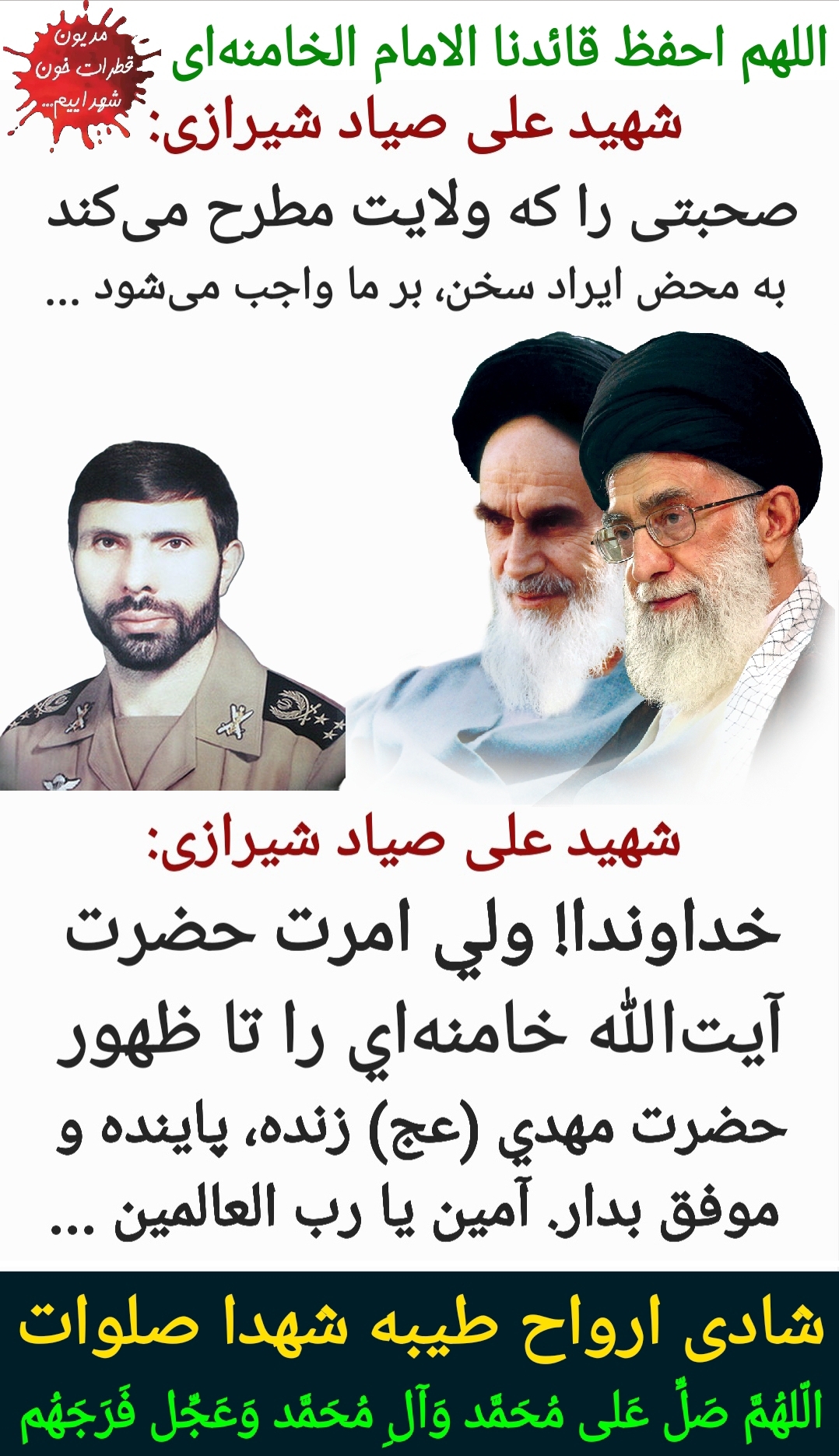
شهید صیاد شیرازی: صحبتی را که ولایت مطرح میکند به محض ایراد سخن، بر ما واجب می شود ...
*****************
هرگونه تبلیغات در صورت انجام ارتباطی به این وبلاگ ندارد
استفاده از کلیه مطالب با ذکر صلوات آزاد است
سلامتی و تعجیل در فرج امام زمان علیه السلام، هدیه به ساحت مقدس حضرت زهراء سلام الله علیها، ائمه اطهار علیهم السلام، امام خامنه ای حفظه الله تعالی و ارواح طیبه شهداء صلوات
الّلهُمَّ صَلِّ عَلی مُحَمَّد وَآلِ مُحَمَّد وَعَجِّل فَرَجَهُم
:: موضوعات مرتبط:
ولایت فقیه ,
شهید ,
دفاع مقدس ,
شهداء مدافع حرم ,
مسئله مهدویت ,
ظهور ,
شهدای کربلا ,
محرم | عاشورا ,
شهدای انقلاب اسلامی ,
,
:: برچسبها:
پنجم شوال ,
سالروز ,
ورود ,
مسلم بن عقيل ,
سفیر امام حسین علیه السلام ,
کوفه ,
یا زهرا سلام الله علیها ,
ظهور ,
امام خامنه ای ,
|
امتیاز مطلب : 36
|
تعداد امتیازدهندگان : 12
|
مجموع امتیاز : 12
|
نویسنده : yamahdi788
تاریخ : سه شنبه 5 فروردين 1404
|
بِسْمِ اللَّهِ الرَّحْمَنِ الرَّحِیمِ
اَلسَّلامُ عَلَیکمْ یا اَهْلَ بَیتِ النُّبُوَّة
الّلهُمَّ صَلِّ عَلَی مُحَمَّدٍ وَ آلِ مُحَمَّدٍ و عَجّل فَرَجَهم
وَلَقَدْ كَتَبْنَا فِي الزَّبُورِ مِن بَعْدِ الذِّكْرِ أَنَّ الْأَرْضَ يَرِثُهَا عِبَادِيَ الصَّالِحُونَ
و در حقيقت، در زبور پس از تورات نوشتيم كه زمين را بندگان شايسته ما به ارث خواهند برد.
سوره مبارکه انبیاء آیه ۱۰۵
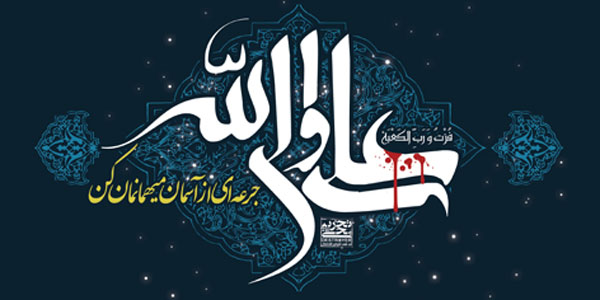
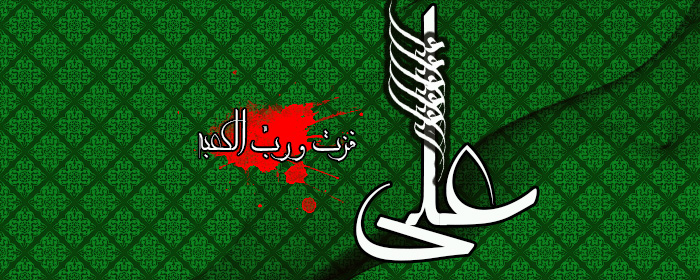
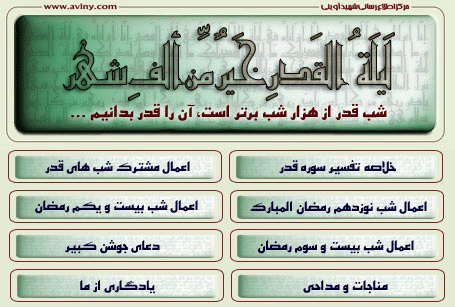

_fqs2.jpg)



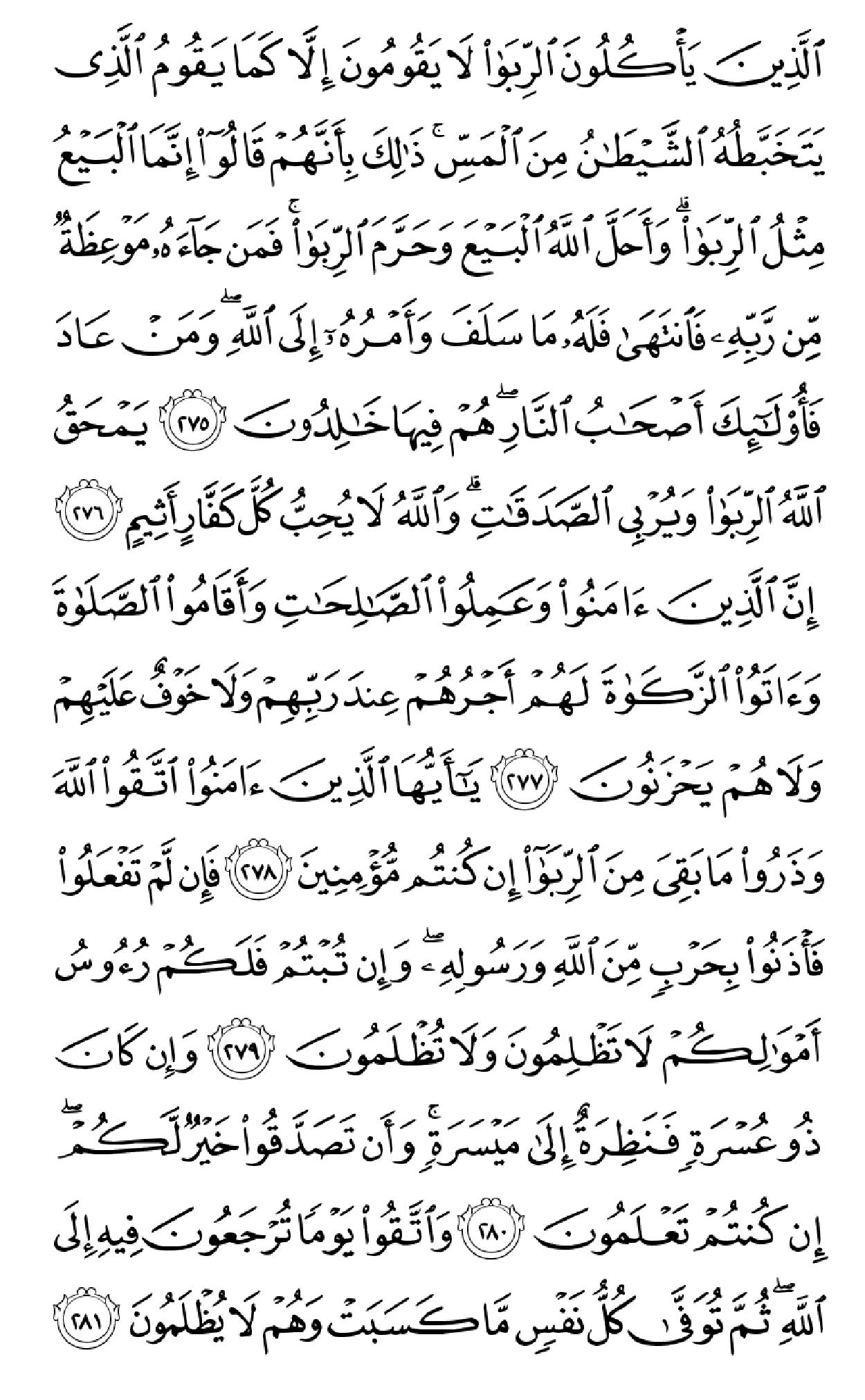
تفسیر صفحۀ ۴۷ قرآن کریم - سورۀ بقره - آیۀ ۲۷۵ - تفسیر نور:
«الَّذِینَ یَأْکُلُونَ الرِّبا لا یَقُومُونَ إِلاَّ کَما یَقُومُ الَّذِی یَتَخَبَّطُهُ الشَّیْطانُ مِنَ الْمَسِّ ذلِکَ بِأَنَّهُمْ قالُوا إِنَّمَا الْبَیْعُ مِثْلُ الرِّبا وَ أَحَلَّ اللَّهُ الْبَیْعَ وَ حَرَّمَ الرِّبا فَمَنْ جاءَهُ مَوْعِظَةٌ مِنْ رَبِّهِ فَانْتَهی فَلَهُ ما سَلَفَ وَ أَمْرُهُ إِلَی اللَّهِ وَ مَنْ عادَ فَأُولئِکَ أَصْحابُ النَّارِ هُمْ فِیها خالِدُونَ» کسانی که ربا میخورند، (در قیامت از قبرها) برنمیخیزند مگر همانند برخاستن کسی که بر اثر تماس شیطان، آشفته و دیوانه شده است. (نمیتواند تعادل خود را حفظ کند، گاهی زمین میخورد و گاهی برمیخیزد)
این (آسیب) بدان سبب است که گفتند: داد و ستد نیز مانند ربا است. در حالی که خداوند خرید و فروش را حلال و ربا را حرام کرده است. پس هر کس که موعظهای از پروردگارش به او رسید و (از رباخواری) خودداری کرد، آنچه در گذشته (از طریق ربا به دست آورده) مال اوست، و کار او به خدا واگذار میشود. امّا کسانی که (دوباره به رباخواری) بازگردند، آنان اهل آتش خواهند بود و در آن جاودانه میمانند.
نکتههای سورۀ بقره - آیۀ ۲۷۵:
«الرِّبا»، در لغت به معنای زیادی و افزایش است.
در شریعت اسلام به معنای زیاده گرفتن در وام یا بیع است. مورد ربا، یا پول است یا جنس. گاهی پول را قرض میدهد و بیش از آنچه داده باز پس میگیرد، که این ربای در وام است و گاهی جنسی را میدهد و مقدار بیشتری از همان جنس را تحویل میگیرد، که این نیز در مواردی ربا میشود.
رباخوار، به کسی تشبیه شده که شیطان او را خبط کرده است. «خبط» به معنای افتادن و برخاستن و عدم تعادل به هنگام حرکت است.
رباخوار در قیامت همچون دیوانگان محشور میشود، چرا که در دنیا روش او باعث به هم خوردن تعادل جامعه گردیده است.
ثروتپرستی، چشم عقلش را کور کرده و با عمل خود چنان اختلافات طبقاتی و کینه را بر میانگیزد که فقر و کینه سبب انفجار شده و اصل مالکیّت را نیز متزلزل میکند. برای این افراد، گویا ربا اصل و خرید و فروش فرع است، فلذا میگویند: بیع و معامله هم مثل رباست و تفاوتی ندارند.
انتقاد از رباخواری، ربا گرفتن و ربا دادن، از ابتدای اسلام مطرح بوده است. در سورۀ روم که در مکّه نازل شده است، میفرماید: «وَ ما آتَیْتُمْ مِنْ رِباً لِیَرْبُوَا فِی أَمْوالِ النَّاسِ فَلا یَرْبُوا عِنْدَ اللَّهِ» «روم، ۳۹» یعنی آنچه به قصد ربا میدهید تا برای شما در اموال مردم بیفزاید، بدانید که نزدخداوند افزون نمیشود.
سپس در سورۀ آل عمران با فرمان «لا تَأْکُلُوا الرِّبَوا» «آل عمران، ۱۳۰» از آن نهی گردیده و بیشترین انتقاد از رباخواری در همین آیات آمده است.
ضمناً آیۀ «وَ أَخْذِهِمُ الرِّبَوا وَ قَدْ نُهُوا عَنْهُ» «نساء، ۱۶۱»، یادآور میشود که در مذهب یهود نیز «ربا» حرام بوده، همچنانکه این حرمت در تورات ذکر شده است. «تورات، سِفر خروج، فصل ۲۳ جمله ۲۵ و سِفر لاویان، فصل ۲۵» آیات مربوط به ربا، به دنبال آیات انفاق آمد، تا دو جهت خیر و شر را که توسط مال و ثروت پدید میآید مطرح کند.
انفاق یعنی دادن بلاعوض و ربا یعنی گرفتن بلاعوض.
هر آثار خوبی که انفاق دارد، مقابلش آثار سویی است که ربا در جامعه پدید میآورد. به همین جهت قرآن میفرماید: «یَمْحَقُ اللَّهُ الرِّبا وَ یُرْبِی الصَّدَقاتِ» خداوند ثروت به دست آمده از ربا را نابود، ولی صدقات را افزایش میدهد.
تهدیدهایی که در قرآن برای اخذ ربا و پذیرش حاکمیّت طاغوت آمده، برای قتل، ظلم، شرب خمر، قمار و زنا نیامده است. «تفسیر المیزان، ذیل آیه»
حرمت ربا نزد تمام فرق اسلامی، قطعی و از گناهان کبیره است.
وقتی به امام صادق علیهالسّلام خبر دادند که فلانی رباخوار است، فرمود: اگر قدرت میداشتم گردنش را میزدم. «وسائل، ج ۱۲، ص ۴۲۹»
همچنانکه حضرت علی علیهالسّلام وقتی با رباخواری مواجه شد، از او خواست توبه کند، وقتی توبه کرد او را رها نمود و به دنبال آن فرمود: رباخوار را باید از عمل خود توبه دهند، همچنان که از شرک توبه میدهند.
از امام باقر علیهالسّلام نقل شده است که فرمود: خبیثترین درآمدها، رباخواری است. «کافی، ج ۵، ص ۱۴۷»
و رسول خدا صلّی اللَّه علیه و آله فرمودهاند: هر گاه خداوند ارادۀ هلاک قریهای را داشته باشد، رباخواری در آن قریه ظاهر میشود. «کنز العمّال، ج ۴، ص ۱۰۴»
و خداوند، فرد رباخوار، وکیل، شاهد و کاتب ربا را لعنت نموده است. «وسائل، ج ۱۲، ص ۴۳۰»
در حدیث میخوانیم: رباخواران، در قیامت همچون دیوانگان محشور میشوند. «تفسیر در المنثور، ج ۲، ص ۱۰۲»
امام صادق علیهالسّلام علّت تکرار آیات ربا را آمادهسازی ثروتمندان برای کار خیر و صدقات میداند و میفرماید: چون از یکسو «ربا» حرام است و از طرف دیگر کنز و انباشتن ثروت به صورت راکد نیز حرام است، پس چارهای برای ثروتمندان جز انفاق و یا کارهای تولیدی مفید باقی نمیماند. «وسائل، ج ۱۲، ص ۴۲۳»
همچنانکه دربارۀ علّت تحریم ربا گفتهاند: رباخواری مانع جریان پول در مسیر تولید و کارهای عامالمنفعه است و به جای تلاش و فکر و بازو، فقط از سود پول بهرهگیری میشود، لذا ربا تحریم شده است.
از امام صادق علیهالسّلام روایت شده است که فرمودند: «لو کان الربا حلالا لترک الناس التجارات» اگر ربا حلال بود، مردم کسب و کار را رها میکردند. «وسائل، ج ۱۲، ص ۴۲۴ و بحار، ج ۱۰۳، ص ۱۱۹»
و از امام رضا علیهالسّلام نیز روایت شده است که فرمودند: اگر ربا شیوع پیدا کند راه قرض دادن بسته میشود. «الحیاه، ج ۴، ص ۳۳۴»
ضمناً چون احتمال در دام ربا افتادن در امور اقتصادی زیاد است، در حدیث میخوانیم: «من اتجر بغیر فقه فقد ارتطم فی الربا» هر کس بدون دانش و آگاهی از مسائل تجاری وارد تجارت شود، گرفتار ربا میشود. «نهجالبلاغه، قصار ۴۴۷»
آثار ربا:
گرفتن پول اضافی، بدون انجام کاری مفید و یا مشارکت در تولید، نوعی ظلم و اجحاف است که موجب پیدایش دشمنی و قساوت میشود.
ربادهنده به جهت بدهیهای تصاعدی، گاهی ورشکست و مجبور به قبول انواع ذلّتها و اسارتها میشود. «تفسیر مراغی، ذیل آیه»
ربا، تعادل جامعه را به هم زده و موجب تقسیم جامعه به دو قطب مستکبر و مستضعف میشود. «تفسیر المیزان»
با توجّه به این آثار تخریبی، نه تنها در شریعت اسلام، بلکه در تمام ادیان آسمانی ربا تحریم شده است.
امّا برخی به بهانههایی میخواهند ربا را توجیه کنند و به دنبال راه فرار هستند. کلاه شرعی ساختن، همانند حیلۀ یهود برای گرفتن ماهی در روز شنبه که در آیات قبل ماجرای آن بیان شد، نوعی بازی بیش نیست و قرآن از اینگونه بازیها انتقاد کرده است.
ربا، آثار تخریبی خود را دارد هر چند که جوامع انسانی آن را در سیستم اقتصادی خود پذیرفته باشند. علّت پیشرفت جوامع غربی، توجّه به علم و صنعت است، نه اینکه رباخواری موجب ترقّی آنها شده باشد.
پیامهای سورۀ بقره - آیۀ ۲۷۵:
۱. رباخواران، از تعادل روحی و روانی برخوردار نیستند و جامعه را نیز از تعادل اقتصادی خارج میسازند. «کَما یَقُومُ الَّذِی یَتَخَبَّطُهُ الشَّیْطانُ»
۲. تشبیه بیع حلال به ربای حرام، نشانۀ عدم تعادل فکری آنان است. «یَتَخَبَّطُهُ الشَّیْطانُ» «بِأَنَّهُمْ قالُوا إِنَّمَا الْبَیْعُ مِثْلُ الرِّبا»
۳. شیطان، قدرت تصرف بر درون انسان را دارد. «یَتَخَبَّطُهُ الشَّیْطانُ مِنَ الْمَسِّ»
۴. توجیه گناه، راه را برای انجام گناه باز میکند. «إِنَّمَا الْبَیْعُ مِثْلُ الرِّبا»
۵. تا قبل از ابلاغ تکلیف، مسئولیّتی نیست. «فَمَنْ جاءَهُ مَوْعِظَةٌ مِنْ رَبِّهِ»
۶. احکام الهی، در جهت پند و تربیت مردم است. «جاءَهُ مَوْعِظَةٌ مِنْ رَبِّهِ»
۷. قانون امروز، شامل گذشته افراد نمیشود. «فَلَهُ ما سَلَفَ»
۸. از گناه ناآگاهان اغماض میشود، ولی از آگاهانِ مغرض و مُصرّ هرگز. «وَ مَنْ عادَ فَأُولئِکَ أَصْحابُ النَّارِ»
تفسیر صفحۀ ۴۷ قرآن کریم - سورۀ بقره - آیه ۲۷۶ - تفسیر نور:
«یَمْحَقُ اللَّهُ الرِّبا وَ یُرْبِی الصَّدَقاتِ وَ اللَّهُ لا یُحِبُّ کُلَّ کَفَّارٍ أَثِیمٍ» خداوند ربا را نابود میکند، ولی صدقات را افزایش میدهد و خداوند هیچ انسان ناسپاس و کافرِ گنهکاری را دوست نمیدارد.
نکتههای سورۀ بقره - آیۀ ۲۷۶:
کلمۀ «محق» به معنای نقصان تدریجی است و مُحاق به ماه گفته میشود که نورش در شبهای آخر آن چنان کاهش یافته که دیده نمیشود. و در مقابل، «الرِّبا» به معنی رشد تدریجی است.
این آیه یادآور میشود که هر چند رباخوار به قصد انباشت ثروت، از دیگران ربا میگیرد، ولی خداوند برکت و آثار خوبی که باید ازدیاد مال داشته باشد از ربا میگیرد.
لازم نیست خود مال رَبَوی از بین برود؛ بلکه اهدافی که از افزایش ثروت در نظر است از بین میرود.
در نظام رَبَوی، سعادت، محبّت و امنیّت نیست و چه بسیار ثروتمندانی که از سرمایۀ خود، هیچ نوع راحتی و آرامش و یا محبوبیّتی به دست نمیآورند. ولی در نظامی که در آن انفاق، صدقه و قرضالحسنه رایج باشد، آن جامعه از برکات زیادی برخوردار است.
در آن نظام، فقرا مأیوس نبوده و اغنیا در فکر تکاثر نیستند. محرومان به فکر انتقام و سرقت، و اغنیا نگران حراست و حفاظت اموال خود نمیباشند و جامعه از یک تعادل نسبی همراه با الفت و رحمت و تفاهم و امنیّت برخوردار خواهد بود.
در تفسیر کبیر فخر رازی آمده است: وقتی رباخوار، عواطف و عدالت انسانی را در خود محو کند، خود و اموالش مورد نفرین فقرا قرار میگیرد و کینه و انتقام و توطئه سرقت هر لحظه او را تهدید میکند و این نمونهای از آن نابودی است که در آیه مطرح شده است.
پیامهای سورۀ بقره - آیۀ ۲۷۶:
۱. به رشد ظاهری ثروت خیره نشوید؛ نظام اقتصادی بر اساس ربا رو به نابودی است. «یَمْحَقُ اللَّهُ الرِّبا»
۲. نابود کردن مال ربوی، از سنّتهای الهی است. «یَمْحَقُ اللَّهُ الرِّبا» فعل مضارع نشانۀ استمرار است.
۳. رواج صدقه و زکات، سبب رشد و استواری اقتصاد است. «یُرْبِی الصَّدَقاتِ»
۴. رباخوار، از رحمت و محبّت الهی محروم است. «وَ اللَّهُ لا یُحِبُّ کُلَّ کَفَّارٍ أَثِیمٍ»
۵. رباخوار، بسیار ناسپاس و گنهکار است. او با گرفتن ربا خود را ضامن مردم، زندگی خود را حرام، عباداتش را باطل، و حرص و طمع قساوت را بر خود حاکم میگرداند. «کَفَّارٍ أَثِیمٍ»
تفسیر صفحۀ ۴۷ قرآن کریم - سورۀ بقره - آیۀ ۲۷۷ - تفسیر نور:
«إِنَّ الَّذِینَ آمَنُوا وَ عَمِلُوا الصَّالِحاتِ وَ أَقامُوا الصَّلاةَ وَ آتَوُا الزَّکاةَ لَهُمْ أَجْرُهُمْ عِنْدَ رَبِّهِمْ وَ لا خَوْفٌ عَلَیْهِمْ وَ لا هُمْ یَحْزَنُونَ» همانا کسانی که ایمان آورده و کارهای نیکو انجام دادهاند و نماز برپا داشته و زکات پرداختهاند، پاداششان نزد پروردگارشان (محفوظ) است و نه ترسی بر آنهاست و نه غمگین میشوند.
نکتههای سورۀ بقره - آیۀ ۲۷۷:
این آیه، برابر رباخواران که «کفّار اثیم» هستند، سیمای مؤمنان را ترسیم میکند که عمل صالح انجام داده و نماز را بر پای میدارند و زکات پرداخت میکنند. تا اشاره به این باشد که زمینۀ برچیده شدن ربا در جامعه، توجّه به ایمان و عمل صالح و احیای نماز و زکات است.
مردم ۴ گروه هستند:
۱. گروهی ایمان آورده و عمل صالح انجام میدهند که اینان «مؤمنانند»؛
۲. گروهی، نه ایمان آورده و نه کار شایسته انجام میدهند که اینان «کافرانند»؛
۳. گروهی ایمان دارند، ولی عمل صالح ندارند که اینان «فاسقانند»؛
۴. گروهی ایمان ندارند، ولی اظهار ایمان میکنند و در ظاهر کار نیک انجام میدهند که اینان «منافقانند».
اگر رباخواران از خدا و مردم بریدهاند، امّا در مقابل، کسانی هستند که اهل ایمان و عمل صالح بوده و از طریق نماز، با خداوند مرتبط میباشند و با پرداخت زکات با مردم پیوند دارند.
پیامهای سورۀ بقره - آیۀ ۲۷۷:
۱. اسلام در کنار مسائل عبادی و فردی، به مسائل اقتصادی و مردمی نیز توجّه دارد. نماز و زکات در کنار هم مطرحند. «أَقامُوا الصَّلاةَ وَ آتَوُا الزَّکاةَ»
۲. ذکر نماز و زکات بعد از عمل صالح، نشانۀ آن است که در میان کارهای شایسته حساب این دو جداست. «عَمِلُوا الصَّالِحاتِ وَ أَقامُوا الصَّلاةَ وَ آتَوُا الزَّکاةَ»
۳. تشویق نیکوکاران به دنبال تهدید بدکاران، یک اصل تربیتی است. «لَهُمْ أَجْرُهُمْ عِنْدَ رَبِّهِمْ»
۴. هوشمند کسی است که در محاسبات، تنها به موجودی امروز که در دست دارد ننگرد، بلکه به آینده و ذخیرههایی که نزد خداوند است توجّه داشته باشد. «عِنْدَ رَبِّهِمْ»
۵. پروردگار، به مؤمنانی که اهل عمل صالح و نماز و زکاتند، نظر ویژهای دارد. کلمۀ «رَبِّهِمْ» اشاره به لطف خاصّ اوست.
۶. وعدههای الهی، انگیزۀ عمل صالح است. «لَهُمْ أَجْرُهُمْ عِنْدَ رَبِّهِمْ»
۷. امنیّت و آرامش واقعی، در سایۀ ایمان و عمل صالح و پیوند با خدا و مردم است. «لا خَوْفٌ عَلَیْهِمْ وَ لا هُمْ یَحْزَنُونَ»
۸. عوامل آرامش، ایمان، عمل صالح، نماز و زکات است. «آمَنُوا وَ عَمِلُوا الصَّالِحاتِ وَ أَقامُواالصَّلاةَ وَ آتَوُا الزَّکاةَ» «لا خَوْفٌ عَلَیْهِمْ وَ لا هُمْ یَحْزَنُونَ»
تفسیر صفحۀ ۴۷ قرآن کریم - سورۀ بقره - آیۀ ۲۷۸ - تفسیر نور:
«یا أَیُّهَا الَّذِینَ آمَنُوا اتَّقُوا اللَّهَ وَ ذَرُوا ما بَقِیَ مِنَ الرِّبا إِنْ کُنْتُمْ مُؤْمِنِینَ» ای کسانی که ایمان آوردهاید! تقوای الهی پیشه کنید و آنچه را از (مطالبات) ربا باقی مانده است، رها کنید، اگر ایمان دارید.
نکتههای سورۀ بقره - آیۀ ۲۷۸:
در آیات قبل به مفاسد ربا اشاره شد که ربا فرد و جامعه را از تعادل خارج و آشفته میکند «یَتَخَبَّطُهُ الشَّیْطانُ» و روشن شد که ربا در حقیقت کم شدن است، نه زیاد شدن «یَمْحَقُ اللَّهُ الرِّبا»
در این آیه نهی از ربا را صریحاً بیان میکند. «ذَرُوا ما بَقِیَ مِنَ الرِّبا»
شأن نزول - سورۀ بقره - آیۀ ۲۷۸:
در تفاسیرِ مجمعالبیان، المیزان و مراغی نقل شده است که وقتی آیۀ تحریم ربا نازل شد، برخی از صحابه همانند خالدبنولید، عباس و عثمان، از مردم مقداری طلب از بابت ربا داشتند، آنها در مورد طلبکاری خود، از پیامبر صلّی اللَّه علیه و آله کسب تکلیف کردند و آیۀ فوق نازل شد.
پیامبر صلّی اللَّه علیه و آله بعد از نزول این آیه فرمود: عباس، عموی من نیز حقّ مطالبه ربا ندارد و قبل از همه، باید خویشان من دست از ربا بردارند.
همچنانکه در طی خطبهای فرمود: «و کل ربا فی الجاهلیه موضوع تحت قدمی هاتین و اول ربا اضع ربا العباس» تمام رباهای مقرّر در دورۀ جاهلیّت را زیر پای میاندازم و از همه پیشتر رباهایی که برای عباس است. «تفسیر فی ظلال القرآن»
پیامهای سورۀ بقره - آیۀ ۲۷۸:
۱. رباخواری، از عادات زمان جاهلیّت بود که مسلمانان صدر اسلام نیز به آن آلوده بودند. «یا أَیُّهَاالَّذِینَ آمَنُوا» «ذَرُوا»
۲. تقوا، مرحلهای بالاتر از ایمان است. «یا أَیُّهَا الَّذِینَ آمَنُوا اتَّقُوا اللَّهَ»
۳. رباخوار، مالک بهره نمیشود و اسلام سود رَبَوی را به رسمیّت نمیشناسد. «ذَرُوا ما بَقِیَ مِنَ الرِّبا»
۴. لازمۀ ایمان و تقوا، صرف نظر کردن از مال حرام است. «إِنْ کُنْتُمْ مُؤْمِنِینَ»
تفسیر صفحۀ ۴۷ قرآن کریم - سورۀ بقره - آیۀ ۲۷۹ - تفسیر نور:
«فَإِنْ لَمْ تَفْعَلُوا فَأْذَنُوا بِحَرْبٍ مِنَ اللَّهِ وَ رَسُولِهِ وَ إِنْ تُبْتُمْ فَلَکُمْ رُؤُسُ أَمْوالِکُمْ لا تَظْلِمُونَ وَ لا تُظْلَمُونَ» پس اگر چنین نکردید، (بدانید که) اعلان جنگ با خدا و رسولش دادهاید و اگر توبه کنید، (اصل) سرمایههایشما از آنِ خودتان است. (و در این صورت) نه ستم میکنید و نه بر شما ستم میشود.
نکتههای سورۀ بقره - آیۀ ۲۷۹:
در اسلام، نه اجازه ربا و بهرهکشی و استثمار داده شده و نه اموال مردم یک جانبه مصادره میگردد. در بعضی نظام ها، مالکیّت ملغی و تمام اموال را از صاحبانشان میگیرند و در برخی دیگر، استثمار و بهرهکشی و ربا، به هر شکلی آزاد است.
پیامهای سورۀ بقره - آیۀ ۲۷۹:
۱. رباخوار، محارب با خداست. او باید بداند که در این جنگ، در یک طرف او قرار دارد و در طرف دیگر، خداوند جبّار. «فَأْذَنُوا بِحَرْبٍ مِنَ اللَّهِ»
۲. رباخواری، گناه کبیره است؛ چون اعلام جنگ با خداوند است. «بِحَرْبٍ مِنَ اللَّهِ»
۳. رباخوار، گمان نکند با مردم محروم طرف است؛ بلکه خداوند به حمایت از محرومان برخاسته و از حقّ آنان دفاع میکند. «بِحَرْبٍ مِنَ اللَّهِ»
۴. چون رباخوار محارب با خداست، از وظایف حکومت اسلامی مبارزه با رباخوارای است. «فَأْذَنُوا بِحَرْبٍ مِنَ اللَّهِ»
۵. برای محاربین با خدا نیز راه توبه باز است. «بِحَرْبٍ مِنَ اللَّهِ» «وَ إِنْ تُبْتُمْ»
۶. رباخوار، تنها مالک اصل مال است؛ نه بهرۀ آن. «فَلَکُمْ رُؤُسُ أَمْوالِکُمْ»
۷. برای نجات محرومان، اصل مالکیّت مردم را نادیده نگیرید و مالکیّت خصوصی در اقتصاد اسلامی پذیرفته شده است. «فَلَکُمْ رُؤُسُ أَمْوالِکُمْ»
۸. سلطهپذیری و سلطهگری هر دو محکوم است، نه ظلم ببینید و نه ظلم روا دارید. «لا تَظْلِمُونَ وَ لا تُظْلَمُونَ»
۹. انتقام ممنوع است. به رباخوار توبهکننده نیز نباید ظلم شود. «فَلَکُمْ رُؤُسُ أَمْوالِکُمْ لا تَظْلِمُونَ وَ لا تُظْلَمُونَ»
۱۰. به توبهکنندگان، نباید به خاطر خلافکاریهای پیشین ظلمی شود. سرزنش کسانی که قبلًا خلافکار بودهاند ممنوع است. «فَإِنْ تُبْتُمْ» «لا تَظْلِمُونَ وَ لا تُظْلَمُونَ»
۱۱. استقرار عدالت اقتصادی، از وظایف حکومت اسلامی است. «لا تَظْلِمُونَ وَ لا تُظْلَمُونَ»
تفسیر صفحۀ ۴۷ قرآن کریم - سورۀ بقره - آیۀ ۲۸۰ - تفسیر نور:
«وَ إِنْ کانَ ذُو عُسْرَةٍ فَنَظِرَةٌ إِلی مَیْسَرَةٍ وَ أَنْ تَصَدَّقُوا خَیْرٌ لَکُمْ إِنْ کُنْتُمْ تَعْلَمُونَ» و اگر (بدهکار) تنگدست بود، او را تا هنگام توانایی مهلت دهید و (در صورتی که واقعاً توان پرداخت ندارد،) اگر ببخشید برای شما بهتر است، اگر (نتایج آن را) بدانید.
نکتههای سورۀ بقره - آیۀ ۲۸۰:
هر چند در این آیه سفارش شده که به بدهکار مهلت داده شود، ولی نباید بدهکار از این موضوع سوءاستفاده کند. لذا اگر بدون عذر در پرداخت بدهی خود تأخیر کند، گناهکار است.
در حدیث آمده است: برای کسانی که بدون عذر، بدهی خود را نمیپردازند، گناهِ دزد نوشته میشود.
همچنانکه برای مهلتدهندگان، پاداشی چون پاداش شهیدان ثبت میشود. به هر روزی که به بدهکار مهلت داده شود، پاداش صدقۀ همان مبلغ، برای طلبکار ثبت میشود. «تفسیر برهان»
گذشت از بدهکار نادار، برای شما بهتر است، زیرا:
الف: شاید فردا برای خود شما نیز این صحنه پیش آید.
ب: مال فراموش میشود؛ ولی بخشیدن به نادار هرگز فراموش نمیشود.
ج: کسب رضایت دل محروم و رضای خالق، از کسب درآمد به مراتب بهتر است.
در احکام فقهی آمده است: زندانی کردن بدهکار معذور، ممنوع است و در مواردی که شخص بدهکار واقعاً مالی نداشته باشد که بدهی خود را پرداخت کند، وظیفۀ حکومت اسلامی است که بدهی او را بپردازد.
پیامهای سورۀ بقره - آیۀ ۲۸۰:
۱. اسلام، حامی مستضعفان است. «وَ إِنْ کانَ ذُو عُسْرَةٍ»
۲. نه تنها ربا نگیرید، بلکه در گرفتن رأسالمال و اصل سرمایه نیز مدارا کنید. «فَنَظِرَةٌ إِلی مَیْسَرَةٍ»
۳. اصل در زمانبندی برای بازپرداخت، توان بدهکار است. «فَنَظِرَةٌ إِلی مَیْسَرَةٍ»
۴. اجبار بدهکاری که توانایی پرداخت دارد، مانعی ندارد. «إِنْ کانَ ذُو عُسْرَةٍ فَنَظِرَةٌ»
۵. بخشیدن بدهکار فقیر، صدقه است. «وَ أَنْ تَصَدَّقُوا خَیْرٌ لَکُمْ»
۶. نظام حقوقی و اقتصادی اسلام، با نظام اخلاقی آن پیوند دارد. گرچه بازپسگیری وام حق است، ولی مهلت دادن و بخشیدنِ بدهکار باید مراعات شود. «فَنَظِرَةٌ» «تَصَدَّقُوا»
۷. محدودیّت انسان و ثروت دوستی او نمیگذارد که انسان به حقیقت ارزشها و کمالات پی ببرد. «إِنْ کُنْتُمْ تَعْلَمُونَ»
تفسیر صفحۀ ۴۷ قرآن کریم - سورۀ بقره - آیۀ ۲۸۱ - تفسیر نور:
«وَ اتَّقُوا یَوْماً تُرْجَعُونَ فِیهِ إِلَی اللَّهِ ثُمَّ تُوَفَّی کُلُّ نَفْسٍ ما کَسَبَتْ وَ هُمْ لا یُظْلَمُونَ» و پروا کنید از روزی که در آن به پیشگاه خداوند بازگردانده میشوید و سپس هر کس (جزای) آنچه را کسب کرده، بدون کم و کاست داده میشود و به آنان ستمی نمیرود.
نکتههای سورۀ بقره - آیۀ ۲۸۱:
این آیه به منزلۀ جمعبندی و هشدار عمومی در پایان آیات ربا است.
آخرین آیهای که بر پیامبر نازل شده است؟
سورۀ بقره - آیۀ ۲۸۱:
در تفاسیری همچون کشّاف، المیزان، مجمعالبیان، کبیر فخر رازی و برهان آمده است که این آیه، آخرین آیهای بوده که بر رسول خدا صلّی اللَّه علیه و آله نازل شده، ولی به دستور پیامبر صلّی اللَّه علیه و آله در اینجا قرار گرفته است.
پیامهای سورۀ بقره - آیۀ ۲۸۱:
۱. قیامت، روز مهمی است. تنوین کلمۀ «یَوْماً» اشاره به عظمت آن روز دارد.
۲. ربا گرفتن و رسیدن به دنیا، ساده و زودگذر است، آنچه ابدی و باقی است، قیامت است. «وَ اتَّقُوا یَوْماً»
۳. تقوی و یاد قیامت، قویترین عامل برای دور شدن از ربا و سایر محرّمات است. «وَ اتَّقُوا یَوْماً تُرْجَعُونَ فِیهِ»
۴. ضامن اجرای نظام اقتصادی اسلام، ایمان و تقوای مردم است. «وَ اتَّقُوا یَوْماً»
۵. در معاملات این جهان، امکان کم و کاست هست، ولی در معامله با خداوند هیچگونه کم و کاستی نیست. «تُوَفَّی کُلُّ نَفْسٍ ما کَسَبَتْ»
۶. ملاک جزا و پاداش، عمل است؛ نه آرزو. «ما کَسَبَتْ»
۷. نگران انفاق و ترک سود رباهایتان نباشید، از اعمال نیک شما اندکی کاسته نمیشود. «تُوَفَّی کُلُّ نَفْسٍ» «لا یُظْلَمُونَ»
منبع: محسن قرائتی، تفسیر نور ، ج ۱، ص ۴۴۲ - ۴۵۲.

بسم الله الرحمن الرحیم
تفسیر سوره مبارکه انعام آیه ۱۵۸
هَلْ يَنْظُرُونَ إِلَّا أَنْ تَأْتِيَهُمُ الْمَلَائِكَةُ أَوْ يَأْتِيَ رَبُّكَ أَوْ يَأْتِيَ بَعْضُ آيَاتِ رَبِّكَ يَوْمَ يَأْتِي بَعْضُ آيَاتِ رَبِّكَ لَا يَنْفَعُ نَفْسًا إِيمَانُهَا لَمْ تَكُنْ آمَنَتْ مِنْ قَبْلُ أَوْ كَسَبَتْ فِي إِيمَانِهَا خَيْرًا قُلِ انْتَظِرُوا إِنَّا مُنْتَظِرُونَ ﴿۱۵۸﴾
۱۵۸ - آيا جز اين انتظار دارند كه فرشتگان مرگ به سراغشان بيايند، يا خداوند (خودش ) به سوى آنها بيايد (چه انتظار محالى ؟!) يا پاره اى از آيات پروردگار (و نشانه هاى رستاخيز) اما آن روز كه اين آيات و نشانه ها تحقق پذيرد ايمان آوردن افرادى كه قبلا ايمان نياورده اند و يا عمل نيكى انجام نداده اند سودى به حالشان نخواهد داشت ، بگو (اكنون كه شما چنين انتظارات غلطى داريد) انتظار بكشيد ما هم انتظار (كيفر شما را) مى كشيم !
Are they waiting for the angels or your Lord to come to them, or for some of the signs of your Lord? On the Day when some of the signs of your Lord come, no soul will be benefited by its belief had it not believed before or earned good in its belief. Say: 'Wait, we are waiting. ' (158)
تفسیر
انتظارات بيجا و محال!
در آيات گذشته اين حقيقت بيان شد كه ما حجت را بر مشركان تمام كرديم و كتاب آسمانى يعنى قرآن را براى هدايت همگان فرستاديم تا هيچگونه بهانه اى براى توجيه مخالفتهاى خود نداشته باشند.
اين آيه مى گويد: اما اين افراد لجوج به اندازه اى در كار خود سرسختند،
كه اين برنامه روشن نيز در آنها تاثير نمى كند، گويا انتظار نابودى خويش ، يا از ميان رفتن آخرين فرصت ، و يا انتظار امور محالى را مى كشند.
نخست مى گويد: آنها جز اين انتظار ندارند كه فرشتگان مرگ به سراغشان بيايند! (هل ينظرون الا ان تاتيهم الملائكة )
(يا اينكه پروردگارت به سراغ آنها بيايد و او را ببينند، و ايمان بياورند!! (او ياءتى ربك )
در حقيقت آنها انتظار امر محالى را مى كشند، نه اينكه آمدن خداوند يا مشاهده او امكانپذير باشد، و اين درست به آن مى ماند، كه به شخص قاتل لجوجى كه پس از ارائه مدارك كافى ، باز منكر جرم خود مى باشد، بگوئيم اگر اينهمه مدارك را قبول ندارى لابد انتظار دارى شخص مقتول زنده شود و در دادگاه حضور يابد و شهادت بدهد كه تو او را كشته اى !
سپس مى گويد: (يا اينكه بعضى از آيات و نشانه هاى پروردگار كه در آستانه رستاخيز و پايان جهان ، واقع مى شود، و به دنبال آن درهاى توبه بسته خواهد شد، انجام گيرد) (او ياتى بعض آيات ربك ).
بنابراين تعبير به (آيات ربك ) اگر چه به صورت كلى و سربسته ذكر شده اما مى تواند به قرينه جمله هاى بعد كه تفسير آن خواهد آمد، به معنى نشانه هاى رستاخيز بوده باشد، مانند زلزله هاى وحشتناك ، و بى فروغ شدن خورشيد و ماه و ستارگان و امثال اينها.
و يا اينكه منظور از آن درخواستهاى نامعقولى بوده است كه آنها از پيامبر (صلى اللّه عليه و آله و سلّم ) داشتند، از جمله اينكه مى گفتند ايمان نمى آوريم مگر اينكه سنگهاى آسمانى بر سر ما ببارد و يا بيابان خشك و سوزان حجاز پر از چشمه ها و نخلستانها شود!.
و به دنبال آن اضافه مى كند: (آن روز كه چنين آيات صورت پذيرد، ايمان آوردن افراد بى ايمان و آنها كه عمل نيكى انجام نداده اند، پذيرفته نخواهد شد) و درهاى توبه به روى آنان بسته مى شود، زيرا توبه و ايمان در آن هنگام ، صورت اجبارى و اضطرارى به خود مى گيرد، و ارزش ايمان و توبه اختيارى را نخواهد داشت (يوم ياءتى بعض آيات ربك لا ينفع نفسا ايمانها لم تكن آمنت من قبل او كسبت فى ايمانها خيرا).
از آنچه گفتيم روشن شد كه جمله (او كسبت فى ايمانها خيرا) به اين معنى است كه در آن روز نه تنها ايمان آوردن سودى نخواهد داشت ، بلكه آنها هم كه ايمان آورده اند ولى عمل صالحى انجام نداده اند در آن روز انجام عمل صالح به حال آنها، نفعى ندارد، چه اينكه اوضاع و احوال طورى است كه هر كسى بى اختيار دست از كارهاى خلاف بر مى دارد و به سوى عمل صالح اجبارا روى مى آورد.
در پايان آيه با لحنى تهديدآميز به اين افراد لجوج مى گويد: (اكنون كه شما چنين انتظارى را داريد در انتظار خويش بمانيد، ما هم در انتظار (كيفر دردناك شما) خواهيم بود) (قل انتظروا انا منتظرون ).
ايمان بدون عمل سودى ندارد.
از نكات جالبى كه از آيه فوق استفاده مى شود اين است كه راه نجات را در ايمان ، آن هم ايمانى كه در پرتو آن اكتساب خيرى شود و اعمال نيك انجام گيرد، معرفى مى كند.
ممكن است اين سئوال پيش آيد كه آيا ايمان به تنهائى كافى نيست هر چند خالى از تمام اعمال نيك باشد؟
در پاسخ مى گوئيم درست است كه افراد با ايمان ممكن است لغزشهائى داشته باشند و مرتكب گناهانى شوند و از گناهان خود نيز پشيمان گردند، و به اصلاح خويش پردازند، ولى كسى كه هيچگونه عمل نيكى در تمام عمرش انجام نداده و فرصت كافى داشته است ، بلكه به عكس هر گونه گناه و زشتكارى از او سرزده ، بسيار بعيد به نظر مى رسد كه اهل نجات باشد و ايمان او به تنهائى مفيد واقع شود، زيرا اصولا نمى توان باور كرد كسى ايمان به مكتبى داشته باشد ولى در تمام عمرش ، حتى يكبار، به برنامه هاى آن مكتب عمل نكند، بلكه به عكس همه دستورات آن را زير پا بگذارد، اين خود دليل روشنى بر عدم ايمان او است ، و به اين ترتيب ايمان بايد حداقل با قسمتى از اعمال نيك همراه باشد، تا معلوم شود ايمانى وجود دارد.
****************
نماز شبهای قدر
دو رکعت ؛ در هر رکعت بعد از حمد، #هفت مرتبه #توحید بخواند و بعد از فراغ هفتاد مرتبه :
« أَسْتَغْفِرُ اللَّهَ وَ أَتُوبُ إِلَیْهِ » بگوید.
در روایت نبوى (صلى الله علیه و آله) است که از جاى خود برنخیزد تا حق تعالى او را و پدر و مادرش را بیامرزد
مفاتیح الجنان
****************
بیان رحمت
بسیاری از مردم از برزخ خود بی خبرندواز بی خبری خود نیز غافل هستند و همین طور نسبت به عالم روحانی خودشان آگاهی ندارند، مگر کسانی که خداوند با دادن معرفت نفس ، به آنها منت نهاده است.شناخت عالم مثال از طریق معرفت نفس است، زیرا حقیقت نفس از عالم ارواح می باشد.در نتیجه کسی که حجاب ماده از روی روح ونفسش برداشته شود ودر عالم مثال نفس خود را از آن خالی ببیند، به آسانی می تواند به حقیقت روح خود که مجرد از شکل است، منتقل شودوچنین شناختی همان است که در سخن پیامبر اکرم صلی الله علیه وسلم آمده است، که می فرماید:((مَنْ عَرَفَ نَفسَهُ فَقَدْ عَرَفَ رَبَّهُ))(( کسی که خود را بشناسد، پروردگار خود را می شناسد)).
کتاب المراقبات مرحوم حاج میرزا جواد آقا ملکی تبریزی

   




امام خامنه ای در دیدار مسئولان وزارت امور خارجه و سفیران جمهوری اسلامی ایران
پرهیز از دیپلماسی التماسی، لزوم تعاملات خردمندانه و انعطاف با حفظ اصول
۳۰ /اردیبهشت/ ۱۴۰۲













https://imamhussain.org/persian/31418
https://hawzah.net/fa/Article/View/107163
شهدای والامقام واقعه کربلا
یا لَیتَنِی كُنْتُ مَعَهُمْ فَأَفُوزَ فَوْزاً عَظِیماً
حجّاج بن مسروق بن جُعف بن سعد العشيره مذحجى جعفى
حجاج بن مسروق بن جعف بن سعد العشیره مذحجی جعفی، از یاران امام حسین(ع) بود که در کربلا به شهادت رسید ...

شهید«حمیدرضا زمانی مجد» 15بهمن ماه 1348 در شهرســتان کنگاور به دنیا آمد. پدرش خداکرم و مادرش اختر نام داشــت. تا دوم متوسطه در رشته تجربی درس خواند. به عنوان ســرباز ارتش در جبهه حضور یافت. دوم مرداد 1367 در مریوان توســط نیروهای بعثی بر اثر اصابت ترکش به شهادت رسید. مزار شهید والامقام در گلزار شهدای زادگاهش واقع است ...
بخشی از وصیتنامه:
زندگی مبارزه است باید با سختی جنگید اگر انسان در این راه، سستی و کاهلی کند و ننگ را بپذیرد فنا خواهد شد و اگر صبر و تلاش و کوشش به خرج دهد در ملکوت اعلی جای خواهد گرفت. وجدان بیدار انسان اجازه نمیدهد که ظالم زور بگوید و مظلوم اطاعت کند پس انسان مومن تا آخرین نفس مبارزه خواهد کرد تا این سیستم را براندازد و قسط و عدل را در جهان برقرار کند مگر نشنیدهاید که حسین (ع) آموزگار بزرگ شهادت، با خون خود، آزادگی و مختار بودن و عاشق بودن و الهی بودن انسان را مهر کرد و به همه تاریخ درس داد و قلب تاریخ را فتح کرد و شمع تاریخ شد؛ سوخت و به بشریت روشنایی بخشید. حال باید چون شمع سوخت و شکافنده ظلمت و نور شد شاید ما هم به صف شهیدان خونین پیکر حسینی پیوستیم ...
سخن آخرم این است که بیشتر مدافع انقلاب باشید و از ارزشهای والای اسلامی و انسانی پیروی کنید تنها به خدا توکل کنید. مبادا امام را چون اهل کوفه که اباعبدالله را بییاور گذاشتند تنها گذارید و کلام آخر اینکه بر سختیها و مشکلات فایق آیید که خدا یار محرومان خواهد بود ...

شهید «فرجالله صالحی»، دهم بهمن 1350 در روستای ســوهان از توابع شهرستان ساوجبلاغ به دنيا آمد. پدرش حبيبالله، كشــاورزی میکرد و مادرش منزلت نام داشــت. دانشآموز دوم متوســطه بود. به عنوان بسيجی در جبهه حضور يافت. بيســت و هفتم ارديبهشــت 1367، در شيخمحمد با اصابت تركش به سر، شهيد شد. پيكر وی را در گلزار شهدای زادگاهش به خاك سپردند ...
بخشی از وصیتنامه:
هیچوقـت امـام را تنهـا نگذاریـد و پشـتیبان سلحشـوران اسـلام باشـید ...

شهید «محمدرضا آقایوسفی»
هشتم اسفند ١٣٤٤، در شهرستان قم به دنيا آمد. از سوى بسيج عازم جبهه ها شد. دهم اسفند ١٣٦٢ در حالیکه به عنوان بى سيم چى در جزيره مجنون حضور داشت، در سالروز تولد ۱۸ سالگی اش بر اثر اصابت تركش به گردن، به مقام شهادت نایل آمد. پيكرش در منطقه باقی ماند. سال ١٣٧٦ پیکرش تفحص شد و در تشییعی با شکوه در گلزار شهدای علی بن جعفر به خاک سپرده شد ...
بخشی از وصیتنامه:
خواهرانم حجاب را، حجاب را، حجاب را فراموش نكنيد. برادرانم تقوى را فراموش نكنيد ...

شهید «جعفر پاینده»
شهريور 1342، در شهرستان قشم به دنيا آمد. پدرش حسين و مادرش شمري نام داشت. تا اول متوسطه در رشته انساني درس خواند. به عنوان پاسدار در جبهه حضور يافت. دهم ارديبهشت 1361، در خرمشهر به شهادت رسيد. اثري از پيكرش به دست نيامد ...
بخشی از وصیتنامه:
نکند روزی برسد که امام بییار و یاور شود. همیشه گوش به فرمان امام باشید و او را دعا کنید ...
از خدا غافل نشوید، نماز خود را به موقع بخوانید، روزه بگیرید و در اجتماعات مذهبی شرکت کنید و به هر طریقی شده نگذارید که خون شهیدان و این انقلاب به هدر برود. شما هستید که باید آینده ایران را بسازید، شما هستید که باید پیام خون این شهیدان را به جهان برسانید، و مظلومیت این انقلاب را به جهان برسانید ...

شهید محسن غفاری
مرداد ماه سال ۱۳۴۴ متولد شد. دروس حوزوی را در مدرسه حجتیه قم میخواند. با آغاز انقلاب فعالیتهای گسترده داشت. آنقدر که دیگر در خانه پیدایش نمیشد. دستگیر و شکنجه شد. اما از هدف دست نکشید. بعد از پیروزی انقلاب مدتی علیه منافقان فعالیت داشت و سپس از طریق بسیج عازم جبهه شد و بعد از سه مرحله اعزام اردیبهشت سال ۱۳۶۱ در عملیات بیت المقدس، آزادسازی خرمشهر، به شهادت رسید ...
بخشی از وصیتنامه:
برادران و خواهران سفارش مىکنم، اگر میخواهید پیروز و موفق باشید، راه شهدا را که همان راه امام است، ادامه دهید ...

شهید «ایوب نقیلو»
چهاردهم دی 1344 ، در شهرستان کرج به دنیا آمد. پدرش محمدحسن، در دانشگاه کارگری می کرد و مادرش سلاطین نام داشت. تا دوم راهنمايی درس خواند. پاسدار بود. هفدهم اسفند 1365، در شلمچه بر اثر اصابت ترکش به شهادت رسید. پیکر وی را در امامزاده محمد(ع) زادگاهش به خاک سپردند ...
بخشی از وصیتنامه:
ما با دادن شهيد مسئوليتمان زياد مىشود شما اگر مسلمان نيستيد لااقل آزاده مرد باشيد نگذاريد كه استعمارمان كنند به فكر اين باشيد كه خون اين شهيدان پايمال نشود ما بايد ادامه دهنده راه آنها باشيم ...

شهید حبیبالله رضایی قزوینیها
پانزدهم اردیبهشت ۱۳۴۴، در شهر قزوین به دنیا آمد. پدرش غلامحسین، در و پنجره فروش بود و مادرش عاتقه قزوینیمقدم(فوت ۲۷ مهرماه ۱۳۹۸. همزمان با اربعین امام حسین(ع)) نام داشت. تا پایان دوره راهنمایی درس خواند. به عنوان پاسدار وظیفه در جبهه حضور یافت. بیست و پنجم اسفند ۱۳۶۶، در حلبچه بر اثر اصابت ترکش و قطع سر، شهید شد. مزار او در زادگاهش واقع است ...
بخشی از وصیتنامه:
ما اکنون در موقعیتى از تاریخ قرار گرفته ایم که تمام مسلمین جهان، چشم امیدشان به ماست و در واقع آن ها رهروان راه ما هستند...
از خواهرانم مى خواهم چون زینب(س) پیام خونین من و تمامى شهدا را به جامعه انتقال دهند...
پیامى کوتاه براى دوستانم و امت حزبالله؛ عزیزان من! اگر اکنون در موقعیتى واقع شدهاید که مىبینید اسلام به وجودتان احتیاج دارد؛ پس چنان چه کوچکترین کوتاهى از خود نشان دهید، بدانید که خیانت به خون شهدا کرده اید. پیام من به امت حزب الله این است: نکند روزى بیاید که اماممان یاورى نداشته باشد. به والله اگر -خداى ناکرده- امام را تنها بگذارید و یاریش نکنید، در روز محشر جلوى یکایک شما را خواهند گرفت؛ پس مواظب باشید این فرزند حقیقى حسین(ع) بییاور نماند ...

شهید شکرعلی الهیاری
شانزدهم اردیبهشت ۱۳۲۱، در روستای خورهشت از توابع شهر تاکستان به دنیا آمد. پدرش رستمعلی (فوت۱۳۶۲)، کشاورز بود و مادرش صدف نام داشت. در حد خواندن و نوشتن سواد آموخت. کارگر بود. سال ۱۳۴۷ ازدواج کرد و صاحب پنج پسر و چهار دختر شد. از سوی بسیج در جبهه حضور یافت. بیست و پنجم اسفند ۱۳۶۳، در شرق رود دجله بر اثر اصابت ترکش به شهادت رسید. مزار او در گلزار شهدای شهر قزوین واقع است.
بخشی از وصیتنامه:
به همگى وصیت مىکنم: نماز را به وقت بخوانید؛ چون رسول اکرم(ص) فرمودند: «نماز، ستون دین است.» ... و اى ملت ایران! قدر این انقلاب و این رهبر عزیز، این موساى زمان و ابراهیم بت شکن دوران را -که بحمدالله براى زنده نگه داشتن اسلام بتها را شکست- بدانید و هر چه در توان دارید -چه جانى و چه مالى- به جبههها کمک کنید تا -ان شاء الله- این بت صدامى هم شکسته شود. باشد تا -ان شاء الله- بعد از صدام، با اسراییل بجنگیم تا دشمن جهان اسلام را نابود کنیم. به امید پیروزى هرچه سریعتر رزمندگان اسلام و نابودى کفر جهانى ...

شهید محمود لشگری
نهم مرداد ۱۳۴۴، در شهر تهران به دنیا آمد. پدرش لطفالله(فوت۱۳۶۰) قهوهچی بود و مادرش بتول نام داشت. تا پایان دوره راهنمایی درس خواند. به عنوان پاسدار در جبهه حضور یافت. بیست و هفتم بهمن ۱۳۶۵، در شلمچه بر اثر اصابت ترکش به شهادت رسید. پیکرش مدتها در منطقه برجا ماند و سال۱۳۷۵ پس از تفحص در گلزار شهدای روستای ضیاءآباد از توابع شهر تاکستان به خاک سپرده شد …
بخشی از وصیتنامه:
ای مسلمانان جهان! از شما میخواهم یاور امام باشید که اوست نایب منجی عالم بشریت. ای خانوادهی عزیزم! وصیت میکنم حامی اسلام و دین خدا باشید، که -خدای ناکرده- خونی که شهدا برای اسلام دادند، به هدر نرود. ای خواهران و مادران! تقاضا دارم حجاب اسلامی را حفظ نمایید؛ جهاد شما، حجاب شماست! از تمام دوستان و آشنایان تقاضا دارم: پشتیبان ولایت فقیه باشید؛ تا -بنا به فرموده ی امام- آسیبی به شما نرسد ...

https://harimeharam.ir/category/14/1
گزیدهای از وصیتنامه عارفانه شهید مدافع حرم «رسول خلیلی»

https://harimeharam.ir/category/14/1
دستنوشته ای از شهید مدافع حرم لبنانی، «محمد علی حسین عواضه» خطاب به امام زمان (عج)

https://harimeharam.ir/category/14/1
بخشی از وصیت نامه شهید مدافع حرم «حامد کوچکزاده»:
«دشمن با تمام قوا از زمین و آسمان، در حال حمله به مرزهای اعتقادی و ایمانی ماست. حرکتی کنید. امروز دشمن در خصوصیترین لحظات ما و به خصوصیترین مکانهای ما نفوذ کرده و بنیان خانواده که یکی از ارکان مهم جامعه میباشد را از هم پاشیده و چگونه است که ما نسبت به این مسائل بیتفاوتیم...»
_shohadaye_karbala_60yl.png)
شهید سید حسن نصرالله:
ما در حال جنگ در نبردی بزرگ هستیم و آمریکا و اسرائیل میخواهند خیمهگاه ما را محاصره کنند. امروز فرمانده خیمهگاه ما امام خامنهای و مرکز آن جمهوری اسلامی ایران است و آمریکا میخواهد آن را محاصره کند ...
به ترامپ و نتانیاهو میگوییم که ما قومی هستیم که نه محاصره، نه تحریم، نه فقر و نه گرسنگی به اراده ما خللی وارد نمیکند. در برابر آمریکا و اسرائیل به امام خامنهای، میگوییم که ای فرزند حسین (ع)، ما تو را تنها نمیگذاریم ...
شهید حاج قاسم سلیمانی:
امروز قرارگاه حسینبن علی، ایران است. بدانید جمهوری اسلامی حرم است و این حرم اگر ماند، دیگر حرمها میمانند. ا گر دشمن، این حرم را از بین برد، حرمی باقی نمیماند، نه حرم ابراهیمی و نه حرم محمّدی(ص) ...
برای نجات اسلام خیمه ولایت را رها نکنید. خیمه، خیمهی رسولالله است. اساس دشمنی جهان با جمهوری اسلامی، آتش زدن و ویران کردن این خیمه است. دور آن بچرخید. والله والله والله این خیمه اگر آسیب دید، بیتاللهالحرام و مدینه حرم رسولالله و نجف، کربلا، کاظمین، سامرا و مشهد باقی نمیماند؛ قرآن آسیب میبیند ...
از اصول مراقبت کنید. اصول یعنی ولیّفقیه، خصوصاً این حکیم، مظلوم، وارسته در دین، فقه، عرفان، معرفت؛ خامنهای عزیز را عزیزِ جان خود بدانید. حرمت او را حرمتِ مقدسات بدانید ...



_gbjl.gif)


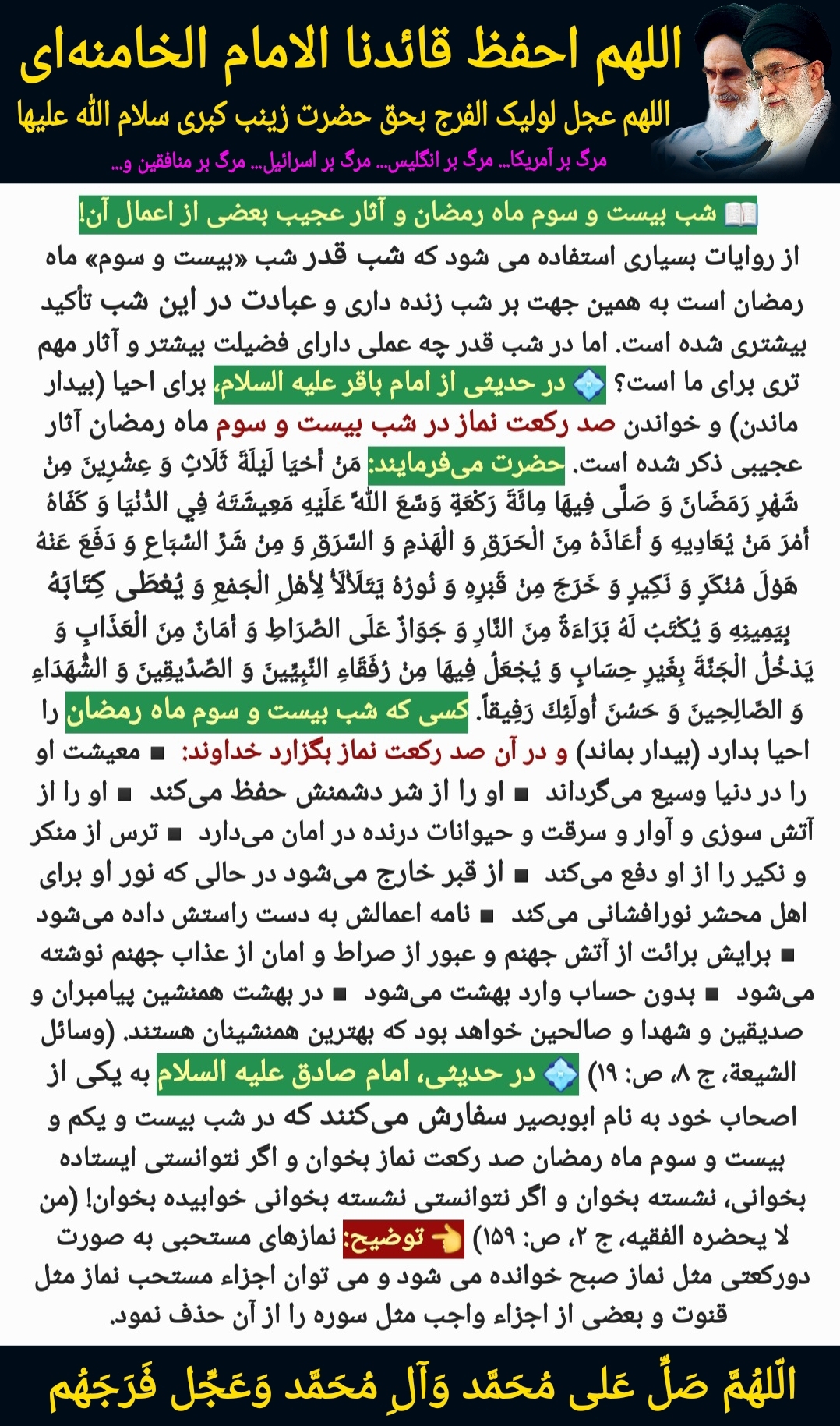 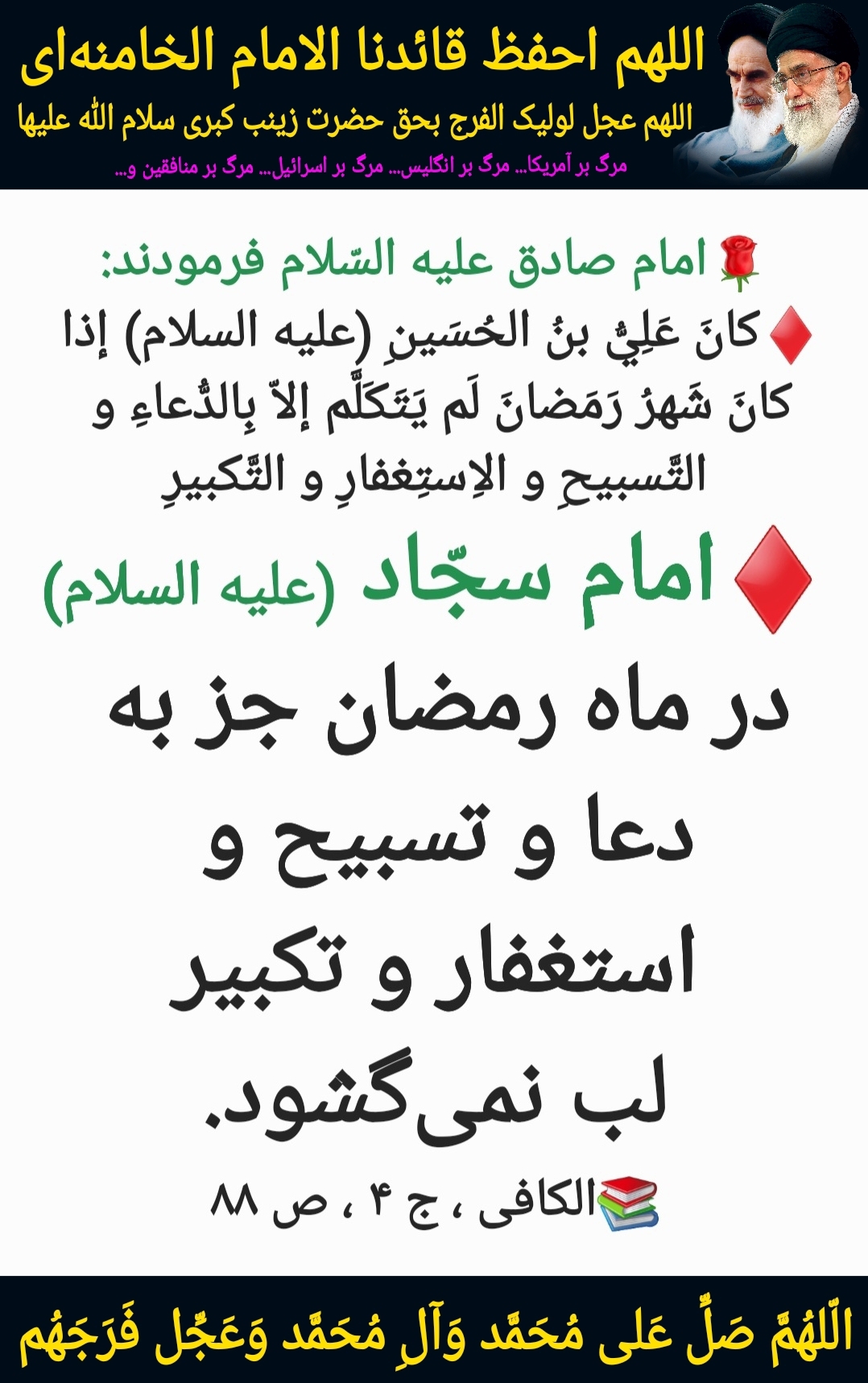
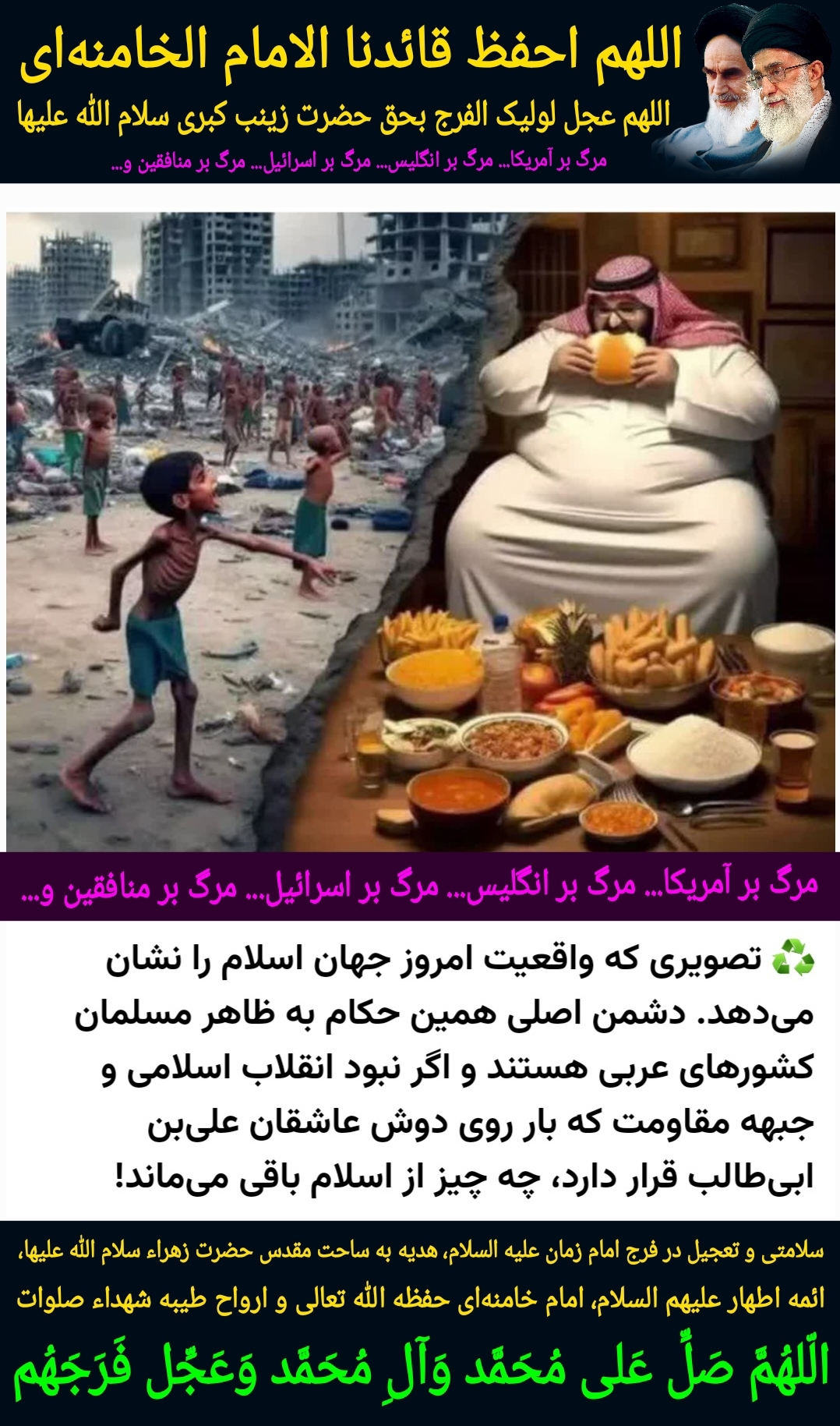 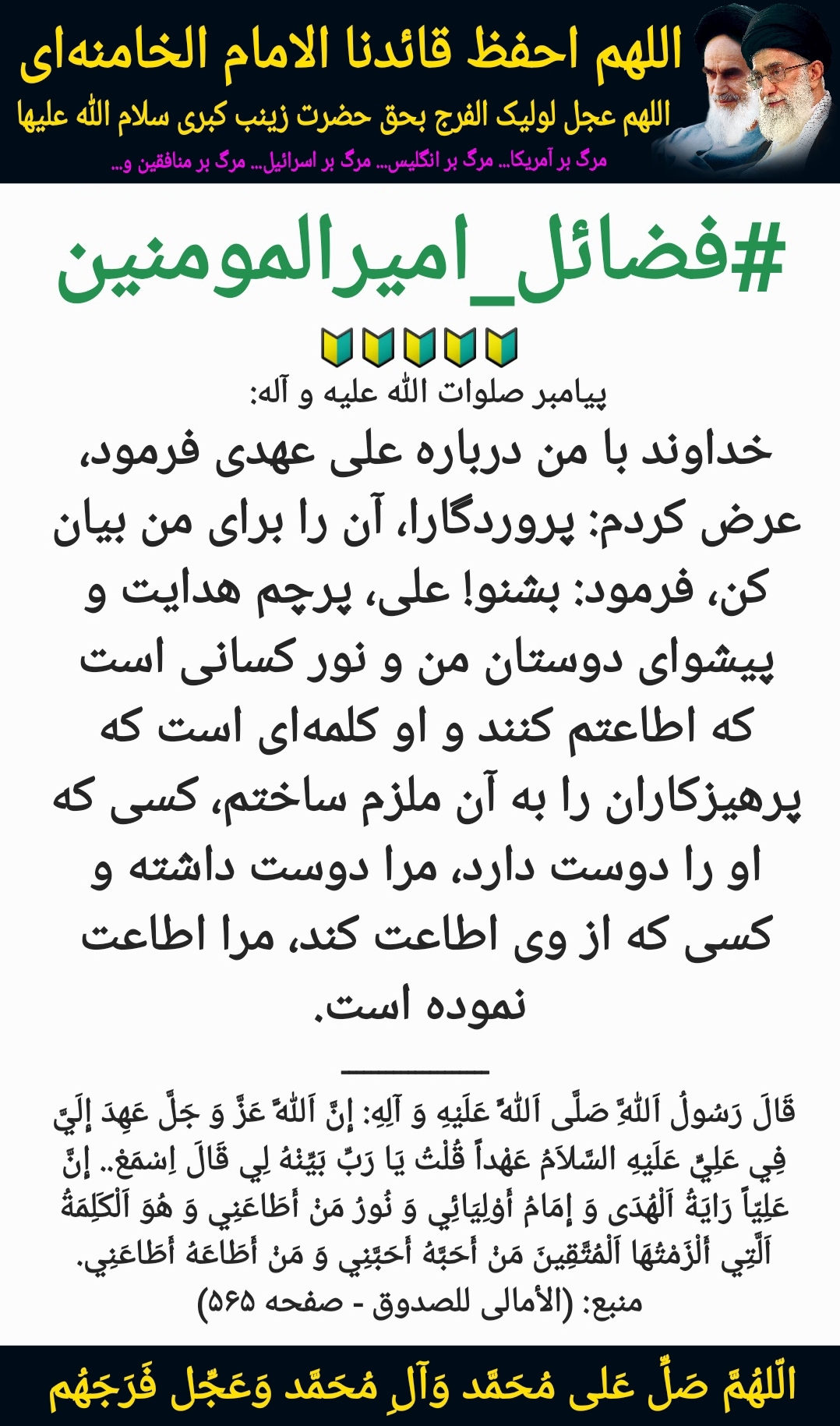
_14021013_0154807_7l85.png)

_gbjl.gif)
کانال فضیلتها | کانال طاووس الجَنَّه | کانال شَرحِ سِرّ ( تماشاگه راز)
پایگاه اطلاعرسانی سید ابراهیم رئیسی:
https://raisi.ir/

الّلهُمَّ صَلِّ عَلَی مُحَمَّدٍ وَ آلِ مُحَمَّدٍ و عَجّل فَرَجَهم
*****

التماس دعا
:: موضوعات مرتبط:
ولایت فقیه ,
شهید ,
دفاع مقدس ,
شهداء مدافع حرم ,
مسئله مهدویت ,
ظهور ,
نماز ,
حجاب ,
قرآن کریم ,
تفسیر سوره مبارکه بقره ,
سوره مبارکه انعام ,
احادیث ائمه اطهار (علیهم السلام) ,
شهدای کربلا ,
شهدای انقلاب اسلامی ,
ماه مبارک رمضان ,
,
:: برچسبها:
تفسیر سوره مبارکه انعام آیه ۱۵۸ ,
تفسیر صفحۀ ۴۷ قرآن کریم ,
تفسیر نور ,
سوره بقره ,
تفسیر سوره مبارکه انعام ,
تفسیر سوره انعام ,
شهدای والامقام واقعه کربلا ,
کربلا ,
یاران امام حسین(ع) ,
شهید «حمیدرضا زمانی مجد» ,
شهید «فرجالله صالحی» ,
شهید «محمدرضا آقایوسفی» ,
شهید «جعفر پاینده» ,
شهید محسن غفاری ,
راه شهدا را که همان راه امام است ,
شهید «ایوب نقیلو» ,
شهید حبیبالله رضایی قزوینیها ,
شهید شکرعلی الهیاری ,
شهید محمود لشگری ,
شهید مدافع حرم «رسول خلیلی» ,
شهید مدافع حرم «محمد علی حسین عواضه» ,
امام زمان (عج) ,
شهید مدافع حرم «حامد کوچکزاده» ,
شهید سید حسن نصرالله ,
شهید حاج قاسم سلیمانی ,
یا زهرا سلام الله علیها ,
ظهور ,
امام خامنه ای ,
|
امتیاز مطلب : 26
|
تعداد امتیازدهندگان : 7
|
مجموع امتیاز : 7
|
نویسنده : yamahdi788
تاریخ : دو شنبه 4 فروردين 1404
|
In the Name of Allah
In the Name of Allah, the Merciful, the Most Merciful
We have written in the Psalms, after the Remembrance: 'The righteous among My worshipers shall inherit the earth
Sura 21: AL-ANBIYA (THE PROPHETS) - Juz' 17 - Translation Qarib
Quran
**************
Note: All content is free to use
Why did Imam Hussain (pbuh) rise up? Did Imam Hussain (pbuh) rise up only for opposing a corrupt ruler like Yazid? Which were the true dimensions of Imam Hussain's movement?

Imam Khamenei:
Imam Hussain's (pbuh) movement is, indeed, perceivable via two perspectives—both of which are acceptable. Nonetheless, when put together, the two views show the extensive dimensions of this movement. One perspective involves the appearance of Imam Hussain’s action, which is a movement against a corrupt, deviated, suppressive and oppressive regime: Yazid’s Regime. But, at the heart of his action, there is a more important movement that the second perspective will lead to the move against ignorance and humiliation of mankind. In fact, even though Imam Hussain (pbuh) fights against Yazid, his extensive historical fight is not against the short-living and insignificant Yazid. Rather, his main fight is against mankind’s ignorance, abasement, deviation and humiliation. Indeed, Imam Hussain (pbuh) fights against such vices.
January 16, 1994
_8j9y.png)
Imam Khamenei:
An ideal government was formed by Islam. If we want to summarize the story of Imam Hussain (pbuh) in a few lines, we can say: humanity suffers from ignorance, oppression and discrimination. The big rulings of the world, the empires of the Caesars and Kisras of the time—either in ancient Persia or the Roman Empire—were regimes of extravagance, non-democratic establishments, ruling through illogical coercion, ignorance and corruption. Smaller establishments--like those in the Arabian Peninsula-- were even worse than them; overall, ignorance reigned over the world. Meanwhile, the light of Islam managed to enlighten, first, the Arabian Peninsula, and then gradually grow to encompass all the world, by the Messenger of God, via Divine assistance, as well as massive and strenuous popular resistance. At the time the Prophet dies, this government was a stable establishment that could be a model for all humans throughout history. Had that establishment continued in the same direction, the history would undoubtedly change. That is, what is supposed to happen centuries later-- at the time of Imam Mahdi’s (pbuh) reappearance in the current situation—would have happened at that time. A world replete with justice, purity, truthfulness, and kindness is the world of the era of Imam Mahdi (pbuh); it is the time when the authentic life of humanity begins. The Authentic life of mankind in this world begins after the reappearance of the Imam of the Time (may God hasten his return), and humanity will achieve great development then. Thus, had the persistence of Prophet Muhammad’s establishment been made possible, and had it been formed during the early years, the history of mankind would have changed, and the final destiny of human life would have unfolded much earlier. However, this was not realized for various reasons ...
January 16, 1994
_gagj.png)
Imam Khamenei:
A world replete with justice, purity, truthfulness, and kindness is the world of the era of Imam Mahdi (pbuh); it is the time when the authentic life of humanity begins. The Authentic life of mankind in this world begins after the reappearance of the Imam of the Time (may God hasten his return), and humanity will achieve great development then ...
January 16, 1994
_wu5v.png)
Imam Khamenei:
The main feature of Prophet Muhammad’s establishment was that instead of relying on oppression, it relied on justice. Instead of relying on paganism and division of human thought, it relied on monotheism and focused on worshipping God. Instead of ignorance, it relied on knowledge and wisdom. Instead of promoting revengeful behavior among the people, it relied on kindness, compassion, the establishment of friendly relations, and tolerance: a neat government both in apparent aspects and innermost aspects. One who grows under such a government becomes pious, chaste, knowledgeable, insightful, active, enthusiastic, dynamic, and moves on the path toward perfection. Fifty years after [the passing away of the prophet], everything changed. The name of Islam remained; the word ‘Islam’ persisted; however, in reality, true Islam was no longer practiced. Instead of the government of justice, a government of oppression was established again. Instead of fraternity and equality, discrimination, division and separation reigned. Instead of wisdom, ignorance ruled. During this period of fifty years, as we move on, we can find hundreds of examples of such cases; researchers are recommended to elaborate on them for the young and investigative minds.
Imamate was transformed into the kingdom! The essence of Imamate is contradictory to the essence of the kingdom. These two are contradictory. Imamate is moral and spiritual leadership and compassionate and belief-related bonds with the people. Whereas, a kingdom is ruling via coercion, power and deluding, without any spiritual, compassion and belief-related bonds. The two are binary opposites. Imamate is a movement among the ummah, for the ummah and in favor of rightfulness. A kingdom is an authoritarian dominance against the interests of the people, only serving particular classes of society, to fulfill the ruling group’s hoarding wealth and pleasing lust. What we see at the time of Imam Hussain’s uprising is the second case, not the first one. That is, Yazid who was in power then, had no relations with the people; he had no knowledge, no piety, no chastity, no experience of jihad for the cause of God, and no belief in Islamic spirituality; his behavior was not a behavior of a believer in Islam, his words were not the words of a wise man. He was in no way similar to Prophet Muhammad (pbuh). In this situation, an opportunity arose for a person like Imam Hussain (pbuh) -- the Imam who was apt for succeeding the Prophet (pbuh)--and he rose up.
Looking at the surface of the events, this uprising was against the corrupt and unpopular regime of Yazid. However, beneath the surface, it is an uprising for the sake of Islamic values, understanding, faith, and dignity. It is for the people to be set free from corruption, subordination, lowliness, and ignorance. It was for this reason that when Imam Hussain (pbuh) left Medina, in a message to his brother Muhammad Ibn Hanafiah, and in reality a message to the history, he wrote: I am not rising out of selfishness, or lust for power, nor to cause mayhem or pain. I rise looking for the correction in my grandfather's ummah. I see that things have changed in the society that the prophet left. It is going towards the wrong direction, towards corruption. It is against the direction coveted by Islam and the prophet had preached. I rise to fight against these [vices].
Imam Hussain’s fight had two dimensions and can have two different fallouts. Nonetheless, both outcomes are good. One result was that Imam Hussain (pbuh) could defeat Yazid’s government and take power away from those who oppressed the people, and devastated the fate of the people, so he could arrange things in an appropriate way. If this had happened, the route of history would have revolved. Another dimension was that, if Imam Hussain (pbuh) could not, for whatever reason, achieve political and military victory, then he would—not by words, but rather by blood, by resisting oppression, by a language that history will never forget—make his narrative flow like a perpetual and non-interruptible stream in history; this is what Imam Hussain (pbuh) did.
Of course, for those who claimed to be believers, if they had acted differently than what they did to Imam Hussain (pbuh), the first case would have happened and Imam Hussain (pbuh) could have reformed the world and the hereafter at that time! But the people did not cooperate. The discussion about why and how the people did not act appropriately, is a very long and exhausting discussion, which I elaborated to some extent some years ago under the title “the common people and the elite”-- it included who failed to act properly, who was responsible for this behavior, how they behaved, and in which areas-- I am not going to mention this discussion now.
So, as a result of some people’s carelessness, the first goal was not achieved; but the second goal was accomplished. This is something that no power can take away from Imam Hussain (pbuh). The power of going to the battlefield of martyrdom; sacrificing oneself and loved ones, the grand sacrifice that is so great that no matter how big the enemy is, it will appear small and unimportant before it. This bright sun will continue to emanate more light in the Muslim world day after day till his light encompasses the whole humanity.
January 16, 1994
_trfj.png)
Imam Khamenei:
Today, Imam Hussain (pbuh) is known to the world more than he was five centuries, or ten centuries ago. Today the situation is such that when impartial intellectuals learn about the history of Islam, and the story of Imam Hussain (pbuh), they feel humble. Even for those who do not know anything about Islam, yet recognize the notions of freedom, justice, dignity, elevation, and lofty human values, Imam Hussain (pbuh) is an invaluable role model in seeking liberty and justice, in rising up against vices and evils as well as in fighting ignorance and humiliation of mankind ...
April 14, 2000
_84f1.png)
Imam Khamenei:
Today, wherever humanity has undergone some defeat, either political, military or economic, the roots of it can be traced to ignorance or abasement. That is, either they do not have the knowledge and necessary understanding, or they understand but have sold themselves cheap. They have bought into abasement and have submitted to viciousness. Imam Sajjad (pbuh) and Imam Ali (pbuh) have been narrated to have said: “Oh! Man, if your essence and existence is to be sold, it has only one price, which is the divine heaven. If you sell it to anything cheaper than heaven, you are at loss.” Even if you are offered the whole world in exchange for accepting abasement and viciousness, it is not fitting. All those who in different places around the world have surrendered to coercion and money of the wealthy and powerful, and have accepted this abasement, --whatever position they are in scholar, politician, political or social activist or intellectual-- they have failed to know their value and have sold themselves cheap. Many politicians of the world have sold themselves.
Dignity is not simply represented by holding high positions like a king or a boss. Sometimes a person is sitting on a throne, bullying a thousand people boastfully. Meanwhile, he is under the coercion of another power or center. He might be a captive of his own desires and lust; but today's political captives will not reach the latter, because they are captives of major powers.
April 14, 2000
_ean8.png)
Imam Khamenei:
The prophets save humans; so, in the Quran, one important purpose of prophethood is said to be establishing justice. “We sent Our Messengers with clear evidence (to support their truthfulness), and sent with them the Book and the Balance so that people would maintain justice {Quran; 57:25}.” In fact, the divine books and the prophets were sent in order for justice to be established in societies; that is, to remove the symbols of oppression, coercion, and corruption. The movement of Imam Hussain (pbuh) was a movement of such nature. He said: “I rose up to reform the Muslim community of my grandfather [Prophet Muhammad (pbuh)].” (Bihar Al-Anvar: V.44, P. 329) He also said: “Whoever observes a ruler legalize what God has made unlawful, violating the covenant of God, opposing the Sunnah of the Messenger of God, and treating the creatures of God sinfully and oppressively; he who does not oppose him with his speech and action, God has a right to bring him to the same fate as that of the tyrant.” (Bihar al-Anwar, v. 44, p. 381) That is if a person sees where corruption and oppression emerge from, yet they do not do anything to oppose the source of corruption and oppression, for God the Exalted, they have the same fate as the corrupt oppressor. He said that he did not rise up for the cause of wickedness, amusement, corruption or oppression. The people of Iraq invited Imam Hussain (pbuh) to rule over them, and Imam Hussain (pbuh) answered their request. So, it is not that Imam Hussain (pbuh) did not think of creating a government; he was indeed thinking of overturning tyrannical powers; either by taking the government away from them or by martyrdom ...
_e5e.png)
Imam Khamenei:
Imam Hussain (pbuh) knew what would his silence, his endorsement and his indifference would do to Islam if he did not take any action. When a power takes all the capacities of a community or some communities under control, and acts tyrannically, if the men of truth do not oppose him, refuting his actions, they have actually endorsed his actions. That is, oppression is endorsed by the men of truth, without them really wanting it. This was a sin committed by the elites from among the Bani-Hashem, and the children of the prominent figures of the early years of Islam. Imam Hussain, however, would not tolerate it, and hence he rose up. It is narrated that after Imam Sajjad (pbuh) returned to Medina from Karbala-- maybe ten or eleven months passed between the time this caravan left Medina and returned-- a person visited him and said: "Oh! Son of the Messenger of Allah, you see, you went and what happened?” He was right; the caravan had left while Imam Hussain (pbuh), the bright sun of Ahlulbait, so much loved by the Messenger of Allah, was among them, leading them. The daughter of Imam Ali (pbuh) had left while she was dignified and honored. The children of Imam Ali (pbuh) --Abbas and others-- the children of Imam Hassan (pbuh), prominent and talented youth of Bani Hashem had all left with this caravan. But the caravan returned with only one man -- Imam Sajjad (pbuh), with the women gone through sufferings of captivity and the loss of their loved ones. Imam Hussain (pbuh), Ali Akbar (pbuh), and even the baby were now gone. Imam Sajjad (pbuh) answered that man, stating: "Imagine what would have happened if we had not gone."
Yes! If they had not gone, their bodies might have survived, but the truth would have died. The soul would have died out. Consciences would have been shattered. Logic and reason would have been condemned throughout history, and even the name of Islam would not have remained ...
March 18, 2002
*****************
Why did Imam Hussain (pbuh) take his family to Karbala? Why didn't he refuse to fight with several thousand-fighter army of Yazid, in spite of having only 72 people in his army? Why didn't he try other methods?
_shohadaye_karbala_w8z.png)
Imam Hussain (pbuh) brought his dear ones to the desert of Karbala in order to clarify the truth. He knew what was going to happen, yet he brought Zeinab, his wives, his children, and his brothers with him. Like the day of Mubahila, it was again a matter of clarifying the truth and promoting Islam in the real sense of the word. That shows the importance of promoting Islam. "If someone comes across a ruthless sultan who mixes up halal with haraam and breaks his promise to God, they deserve living with the sultan in the hereafter." That is to say, when someone sees such a person, they should clarify the truth through their words and actions just as Imam Hussain (pbuh) did - and he paid the price for it. Imam Hussain brought his dear ones and his wives and children to Karbala in order to clarify the truth.
Dec 13, 2009
_pfyb.png)
Imam Khamenei:
One can clearly notice in his lifestyle all the methods that could have been used by a descendant of the Holy Prophet (pbuh) to preserve the great legacy of Islam which has been passed down by the Holy Prophet (pbuh) and his father as well as their genuine followers. We can clearly see everything in the lifestyle of the Lord of the Martyrs (pbuh) - everything ranging from clarification to forewarning, to promotion of Islam, to provoking the conscience of prominent figures of his time during a sermon in Mina. All these things are tangible in the lifestyle of the Lord of the Martyrs (pbuh). Later on, he stood up against a great deviation and laid down his life. Imam Hussain (pbuh) was aware of the consequences of his movement. He was an infallible Imam. Infallible Imams' extensive knowledge and insight are beyond our heads. Imam Hussain (pbuh) revolted to set a role model and he refused to surrender. He asked people to help him and when a group of people from Kufa expressed their willingness to accompany him on this path, Imam Hussain (pbuh) accepted their offer and moved towards Kufa and he did not give up in the middle of the way. Imam Hussain (pbuh) stood up against the deviated current of his time, which was extremely dangerous. And this became a lesson and Imam Hussain (pbuh) himself makes the same point. That is to say, he backed up his action with the order of Islam. He said that his duty was what he was doing. He said that he had to express his opposition, no matter what the consequences were. He said, "It is good if my destiny is a victory and if my destiny is martyrdom, so much the better." This was how Imam Hussain (pbuh) acted.
This was a perfect instance of self-sacrifice and it safeguarded Islam. This move preserved Islam. This move institutionalized values in society. If Imam Hussain (pbuh) had not accepted this danger, if he had not made a move, if he had not taken action, if his blood had not been shed, if those great tragedies had not happened to the shrine of the Holy Prophet (pbuh), to Imam Ali's (pbuh) daughter and to the Holy Prophet's (pbuh) descendants, this event would not have gone down in history. The event that could have prevented that great deviation had to shock people and history as much as the deviation did. This shows Imam Hussain's (pbuh) self-sacrifice.
Of course, this is easier said than done. What Imam Hussain (pbuh) did was an extraordinary feat. That is to say, the dimensions of his action are far more than what we estimate. We usually ignore aspects and details. Once I spoke about Imam Hussain's (pbuh) patience. His patience was not limited to enduring thirst or seeing his companions being killed. These things are relatively easy to tolerate. The kind of patience that is difficult to practice is to listen to influential, aware and respectable people who keep creating doubts and telling you that what you are doing is dangerous and wrong. Who did those things? People like Abdullah Ja'far, Abdullah Zubair and Abdullah Abbas. These prominent figures of that time were constantly telling Imam Hussain (pbuh) not to do what he was doing. If it were somebody else, somebody who did not have that determination and stable character, he would have thought, "Well, I did my duty. These people are talking like this and the world is acting like that, so I should just say what I am supposed to say and do nothing else." A person who decides to stand up against such statements, such temptations, such doubts and such efforts to bend sharia and is not dissuaded from continuing his path - such a person is the one who can give rise to such a great transformation. In this regard, our magnanimous Imam (r.a.) was similar to the Lord of the Martyrs. I explained this in another meeting and I do not want to go into the details now. This was how Imam Hussain (pbuh) acted as a guardian.
Jul 4, 2011
_p6k0.png)
Imam Khamenei:
Zeinab al-Kubra (pbuh) is a prominent role model in history and shows the significance of a woman's presence in one of the most important events in human history. Blood gained a victory over the sword on the day of Ashura, and Zeinab al-Kubra (pbuh) was the cause of that victory. This was because the forces of righteousness were apparently defeated in a military fight in Karbala, but Zeinab al-Kubra's (pbuh) behavior was the factor that turned this apparent defeat into a permanent and decisive victory. That victory was due to the role she played after the day of Ashura. That is a very important point. The event proved that women are not on the periphery of history. It proved that women can have a central role in important historical events. This has been pointed out in several places in the Holy Quran as well. But Zeinab al-Kubra (pbuh) is a recent example and does not belong to ancient times. The story of her life is a tangible event. She played a brilliant role, making the enemies - who had apparently won the battle and slain all their opponents - feel humiliated in their own base. She branded them with permanent disgrace and turned their victory into a defeat. That was what Zeinab al-Kubra (pbuh) did. She proved that it is possible to turn feminine morality and modesty into glory and a great jihad …
Apr 21, 2010
_752q.png)
Imam Khamenei:
https://english.khamenei.ir/news/5942/Who-is-Imam-Hussain-Why-did-he-launch-an-uprisingThe greatness of Zeinab al-Kubra's (pbuh) movement is reflected in what is left of her sermons. Her unforgettable sermon in Kufa's marketplace was not just an ordinary speech. It was not just the personal opinion of an important figure. Her sermon was a great and beautifully-worded analysis of the Islamic community's situation at that time. The sermon included the most profound Islamic concepts. See how strong her character was. Her brother - her Imam and leader - had been martyred in a desert just two days before. Her dear ones, her children, and many other people had been martyred. She and tens of other women and children were taken captive on the same day. They were paraded in different places. Some of the people who were watching them were cheerful and some were shedding tears. Zeinab (pbuh) suddenly started her great mission in that critical situation. She spoke like her father did when he was delivering a sermon to his people during his rule. She spoke with the same tone. She spoke using the same kind of words Imam Ali (pbuh) would use. She was equally eloquent and precise, and her words were equally profound. "O plotters and pretenders, maybe you yourselves were starting to believe that you were following Islam and the Holy Prophet's household, but you failed miserably in the test. You proved to be blind in the fitna. Do you pledge allegiance while you are planning a conspiracy? You can do nothing but engage in shifting allegiance, hypocrisy, flattery, self-humiliation, and empty talk. Your actions were different from your words. You became arrogant and wrongly thought that you were pious. You thought you were still revolutionary. You thought you were still the followers of the Commander of the Faithful. But the truth was something else. You were not able to deal with the fitna. You were not able to save yourselves. You ruined everything you had done before. Because of your lack of insight, your lack of knowledge of the situation, and your inability to distinguish right from wrong, you ruined everything you had built. You look faithful and you keep making revolutionary claims, but deep down you are empty and weak." Zeinab al-Kubra (pbuh) presented a deep analysis of her society's pathologies ...
Apr 21, 2010
_b338.png)
Imam Khamenei:
Zeinab al-Kubra (pbuh) presented a deep analysis of her society's pathologies.
She spoke firmly and eloquently in that difficult situation. It was not the case that she had an audience sitting in front of her and listening in silence. She was not speaking the way an orator would speak to his audience. She was surrounded by the enemies, holding spears in their hands. There were also some ordinary people there - the same people who gave up Moslem to Ibn Ziad, the same people who wrote letters to Imam Hussain and then broke their allegiance to him, the same people who hid in their homes exactly when they were supposed to stand up to Ibn Ziad. Among the people there were also some individuals who were not courageous enough to do what they should have done, and they were watching Imam Ali's daughter in tears on that day. Zeinab al-Kubra (pbuh) was faced with this motley and unreliable crowd, yet she spoke in a firm manner. She was an exemplary woman in history. Such women cannot be considered weak. This faithful feminine nature may reveal itself in difficult conditions. She is a role model for all great men and women in the world. She presented a deep analysis of the problems facing the revolution started by the Holy Prophet (pbuh) and Imam Ali (pbuh). She said, "You could not distinguish between right and wrong in the fitna. You were unable to fulfill your duty. As a result, they severed the head of the Holy Prophet's (pbuh) grandson and put it on a spear." We can understand the greatness of her character when we consider such things.
Apr 21, 2010

Imam Khamenei:
Zeinab (pbuh) played an unparalleled role on the way to Karbala with Imam Hussain (pbuh), on the day of Ashura with all those hardships, and after Imam Hussain (pbuh) had been martyred. It is impossible to find a similar figure in history. Later on, numerous events took place - during her captivity, in Kufa, and in Sham. Because of these great selfless efforts, Zeinab al-Kubra (pbuh) gained a prominent position before Allah the Exalted, and this is something that we cannot describe …
Feb 8, 2010

Imam Khamenei:
In the Holy Quran Allah, the Exalted mentions the names of two women as perfect examples of faith. God also mentions the names of two women as examples of infidelity. "Allah sets forth, for an example to the unbelievers, the wife of Noah and the wife of Lut: They were (respectively) under two of our righteous servants" [The Holy Quran, 66: 10]. These two women exemplify infidelity. That is to say, Allah the Exalted, mentions women, not men, as examples of both infidelity and faith. "And Allah sets forth, as an example to those who believe the wife of Pharaoh" [The Holy Quran, 66: 11]. He mentions the wife of Pharaoh and Mary as two perfect examples of faith. "And Mary the daughter of Imran" [The Holy Quran, 66: 12].
A brief comparison between Zeinab al-Kubra (pbuh) and the wife of Pharaoh would show the greatness of Zeinab al-Kubra's (pbuh) position. In the Holy Quran, the wife of Pharaoh has been recognized as an example of faith for both men and women until the end of time. But just compare the wife of Pharaoh - who had faith in Moses' prophethood and had been enchanted by his guidance - with Zeinab al-Kubra. When she was tortured by Pharaoh - according to narrations and historical texts, she passed away due to the torture she suffered - she was frustrated by the physical pain. She said, "O my Lord, build for me, in nearness to You, a mansion in the Garden, and save me from Pharaoh and his doings." [The Holy Quran, 66: 11] In fact, she was praying for her death: "And save me from Pharaoh and his doings." This was while her problem was only the physical torture. Unlike Zeinab al-Kubra, she had not suffered the loss of several brothers, two children, and many of her relatives and nephews. She had not watched her dear ones go to the battlefield where they were supposed to be killed. Asiah - the wife of Pharaoh - did not have to endure the psychological pains that Zeinab al-Kubra went through.
On the day of Ashura, Zeinab al-Kubra watched many of her dear ones go to the battlefield to get martyred. She watched Hussain ibn Ali (pbuh), Abbas, Ali Akbar, Qasem, her children, and other dear ones go to the battlefield. After they were martyred, she went through all those pains: The invasion of the enemy, disrespect, and the responsibility to take care of the surviving children and women. Is it possible to compare the enormity of this tragedy with physical pain? But when she was faced with these difficulties, Zeinab al-Kubra did not tell God to save her. She did not say, "O my Lord, save me." On the day of Ashura, she said, "O God, accept this from us." While the shredded body of her brother lay in front of her eyes, tells God, "O God, accept this sacrifice from us." When she was asked to describe what she had seen, she replied, "I did not see anything but beauty." All those tragedies were beautiful to Zeinab al-Kubra because they were from and for God - because they were supposed to promote the word of God. See how different this position, this patience, and this love of justice and truth are compared to Asiah's position described in the Holy Quran. This shows the greatness of Zeinab's position …
Feb 8, 2010

Imam Khamenei:
On the day of Ashura, Zeinab al-Kubra watched many of her dear ones go to the battlefield to get martyred. She watched Hussain ibn Ali (pbuh), Abbas, Ali Akbar, Qasem, her children, and other dear ones go to the battlefield. After they were martyred, she went through all those pains: The invasion of the enemy, disrespect, and the responsibility to take care of the surviving children and women. Is it possible to compare the enormity of this tragedy with physical pain? But when she was faced with these difficulties, Zeinab al-Kubra did not tell God to save her. She did not say, "O my Lord, save me." On the day of Ashura, she said, "O God, accept this from us." While the shredded body of her brother lay in front of her eyes, tells God, "O God, accept this sacrifice from us." When she was asked to describe what she had seen, she replied, "I did not see anything but beauty." All those tragedies were beautiful to Zeinab al-Kubra because they were from and for God - because they were supposed to promote the word of God. See how different this position, this patience, and this love of justice and truth are compared to Asiah's position described in the Holy Quran. This shows the greatness of Zeinab's position.
This is the nature of actions that are carried out for the sake of God. Therefore, Zeinab's actions are currently a model, and her name and achievements will remain until the end of time. The permanence of Islam and the divine path and continuation of this path by God's servants are based on what Hussain ibn Ali (pbuh) and Zeinab al-Kubra (pbuh) did. That is to say, as a result of the great patience, resistance, and endurance of hardships, you see that religious values have gained a lot of ground in the modern world. All these human values, which are consistent with human nature in different schools of thought, are rooted in religious values. These values have been promoted by religion. That is the nature of efforts for a divine cause ...
Feb 8, 2010

Imam Khamenei:
What is the use of crying and mourning the martyrdom of Imam Hussain (pbuh) after 1400 years?
"Why are you disseminating sadness, crying and tears among people?" They complain. This is not sadness and tears for the sake of sadness and tears. This is for the sake of the values. The things that lie behind the lamentation, beating the chest and the head, and shedding tears are the dearest things that one might find in the treasure trove of humanity, and they are the divine spiritual values. The Shia are trying to uphold the fact that Hussain ibn Ali (AS) is the epitome of all these values. The Shia are trying to keep their memories alive.
And if the Muslim Ummah keeps Imam Hussain's (AS) name and memory alive and follows him, it will overcome all the obstacles and hardships. And that is why all of us in the Islamic Revolution, in the Islamic Republic, from the highest to the lowest echelons including the people, the authorities, the senior officials and our honorable Imam have relied on the issue of Imam Hussain and the issue of Ashura and people's mourning. The mourning has a symbolic as well as a realistic aspect. It binds hearts together and broadens knowledge ...
Jan 9, 2008

Imam Khamenei:
I would like to discuss a point regarding the efforts to promote Islam in the month of Muharram. Some people may question the value of the ceremonies for mourning Imam Hussain's (pbuh) martyrdom. They may say, "If you want to speak about Imam Hussain's (pbuh) movement, just go ahead and speak about his movement. Why all the crying?" This is a wrong assumption. It will be extremely hard to move ahead on this path in the absence of this emotional connection to the infallible Imams. This is why Imam Khomeini (r.a.) recommended the traditional forms of mourning.
The Quranic verses about the role of the infallible Imams are interpreted in three different ways. Wilayat is one of these interpretations. "Your guardian can only be Allah - and His messenger and those who believe, who establish worship and pay charity, and bow down (in prayer)." [The Holy Quran, 5: 55] Another interpretation is submission and obedience. "Obey Allah and obey the Messenger and those in authority from among you." [The Holy Quran, 4: 59]
Friendship is the third interpretation. "Say: I do not ask of you any reward for it but love for my near relatives." [The Holy Quran, 42: 23] What is this friendship? People are advised to accept their Wilayat and obey them, but what is friendship for? This friendship is a kind of assurance. After the Holy Prophet (pbuh) passed away, those who ended this friendship gradually brushed aside the leadership of the infallible Imams (pbut). In the absence of this sense of friendship, the Islamic Ummah will face the same disasters. Therefore, this sense of friendship is of paramount importance, and it can be achieved through this emotional connection to the infallible Imams (pbut). Narrating the tragedies that happened to them is an attempt to establish this emotional connection. Similarly, praising their virtues [through the mourning ceremonies] is another way to form this emotional bond.
Therefore, it is necessary to hold the mourning ceremonies and narrate the events of Ashura. Some people should not adopt a so-called intellectual position and reject the necessity of these mourning ceremonies. These ceremonies are necessary, and they will always be necessary. Of course, some forms of mourning are unacceptable. For instance, tatbir [a religiously prohibited ritual in which people cut their foreheads] has been declared haraam, and it must not be practiced. That is because tatbir will make the enemies more insolent and will give them an advantage over those who love the members of the Holy Prophet's household. But the common mourning rituals can increasingly strengthen one's emotional connection to the infallible Imams. These rituals are very good.
Dec 13, 2009
_orte.png)
Imam Khamenei:
Why is the uprising of Ashura different from all the uprisings and movements of the world?
We need to read between the lines, and carefully ponder over the life story of Hussain ibn-Ali (pbuh). Many have risen up in the world; they have had a leader, and they were also killed. Among them, numerous were children of the prophets and Imams (pbut). However, Imam Hussain (pbuh) was unique. The event of Karbala was extraordinary. The martyrs of Karbala have a special position. Why? The answer is to be searched in the nature of the event, which gives a lesson to us all, including and maybe, in particular, to you, dear [disabled] war veterans.
One characteristic of the event is that Imam Hussain's movement was solely and truly for the sake of God, the religion and rectifying the society of Muslims. This first feature is very important. Imam Hussain (pbuh) stated: "I did not rise up [leaving my homeland] out of self-interest, for the sake of seeking pleasure, corruption or oppression;”—that is, it was not for swaggering, selling himself, desiring something for himself, or a pretentious spectacle. There was not even a bit of oppression or corruption in this movement. “I rise up only for the sake of rectification of the nation of my grandfather, the Messenger of Allah."-This is an extremely important point. The Arabic word used which means 'only' indicates that there is no other intention that can contaminate the pure intention and the sun-like mind of Imam Hussain (pbuh). When addressing the first Muslims of the early years of Islam, the Holy Quran states: "Do not be like those who marched out boastfully to show off their strength to people and hinder people from the way of God {Quran; 8:47}.” Here, Imam Hussain (pbuh) says: “I did not rise up out of self-interest or for the sake of seeking pleasure.”
These are two different manners, two different behaviors. The Quran reads: "Do not be like those who marched out boastfully”, arrogantly, and selfishly. It means that this kind of behavior lacks purity of intentions. That is, in the movement of the corrupt approach, it is only self-centeredness that matters. “To show off”: This kind of person adorns himself, rides an expensive horse, wears pieces of jewelry, recites arrogant chants, and comes out. Toward where? Toward the battlefield. The battlefield is where this person and many like him will die. Such a person rises up in this manner. There is nothing but arrogance in him.
This is one way [of coming out]. On the other side, the best example is Hussain Ibn Ali (AS) who is pure from any form of selfishness and is not after self-interest or personal, familial, or communitarian gains. This is the first characteristic of the movement of Hussain Ibn Ali (AS). The more selfless one is, the more value does he gain in what he does. The more one moves away from the peak of selflessness, the closer they get to the peak of selfishness, egotism, self-interest, personal and seeking familial gain and such which is a whole other spectrum. Between that pure selflessness and pure selfishness, there is a vast field. Going from one side of it to the other decreases the value of our work. It becomes less fruitful, and also less durable. This is an outcome of the matter. The more defective the product, the sooner it decays. If it is pure, it will never go bad. Giving you a physical example, a piece of 100% pure gold never decays. Nor does it rust. But the more copper, iron, and other cheaper elements are added to the alloy, the more it becomes prone to decay and destruction. This is a general rule.
This applies to what is tangible. But when it comes to spirituality, these equations are far more discerning. We do not understand it because of our materialistic and ordinary vision. Nonetheless, men of vision and understanding perceive. The Critic in this matter, the Goldsmith and the Jeweler, is God the Almighty. And for sure, the Critic sees well. If there is an ounce of impurity in our work, its value would diminish accordingly, and God would reduce its lasting effect ...
January 16, 1994
_s8q8.png)
Imam Khamenei:
Why is the uprising of Ashura different from all the uprisings and movements of the world?
God, the Exalted, is an insightful critic. The work of Imam Hussain (pbuh) is a work in which there is not even a slight hint of impurity. Hence, you see this quality achievement has lasted to this day and will last forever. Who could believe that after these people were killed in that desert far from their homes, while their bodies were buried there; with so much propaganda spread against them; all killed in such a heartless manner; their hometown of Medina was put on fire even after their martyrdom (the story of Harra, which happened the next year); -- this rose garden was devastated, and the petals of roses were all thrust, yet, later anyone would feel the aroma of the rosewater from this garden? According to which rule of nature, a petal of that rose garden can last so long in nature? However, you view the more time passes by, the more the aroma of that rose garden spreads. There are some people who do not believe that Prophet Muhammad (pbuh) is the grandfather of Imam Hussain (pbuh) and that he follows in his path; yet, they believe in Imam Hussain (pbuh)! Some do not believe in his father, Ali (pbuh), yet, they believe in Imam Hussain (pbuh)! They do not believe in God—the God Imam Hussain worshipped, yet, before Imam Hussain (pbuh), they are humble and respectful! This is the outgrowth of Imam Hussain’s purity …
January 16, 1994
Source:
Who is Imam Hussain? Why did he launch an uprising?
Links:
Imam Hussain’s Revolution for Humanity
https://www.leader.ir/en
https://www.khamenei.ir/
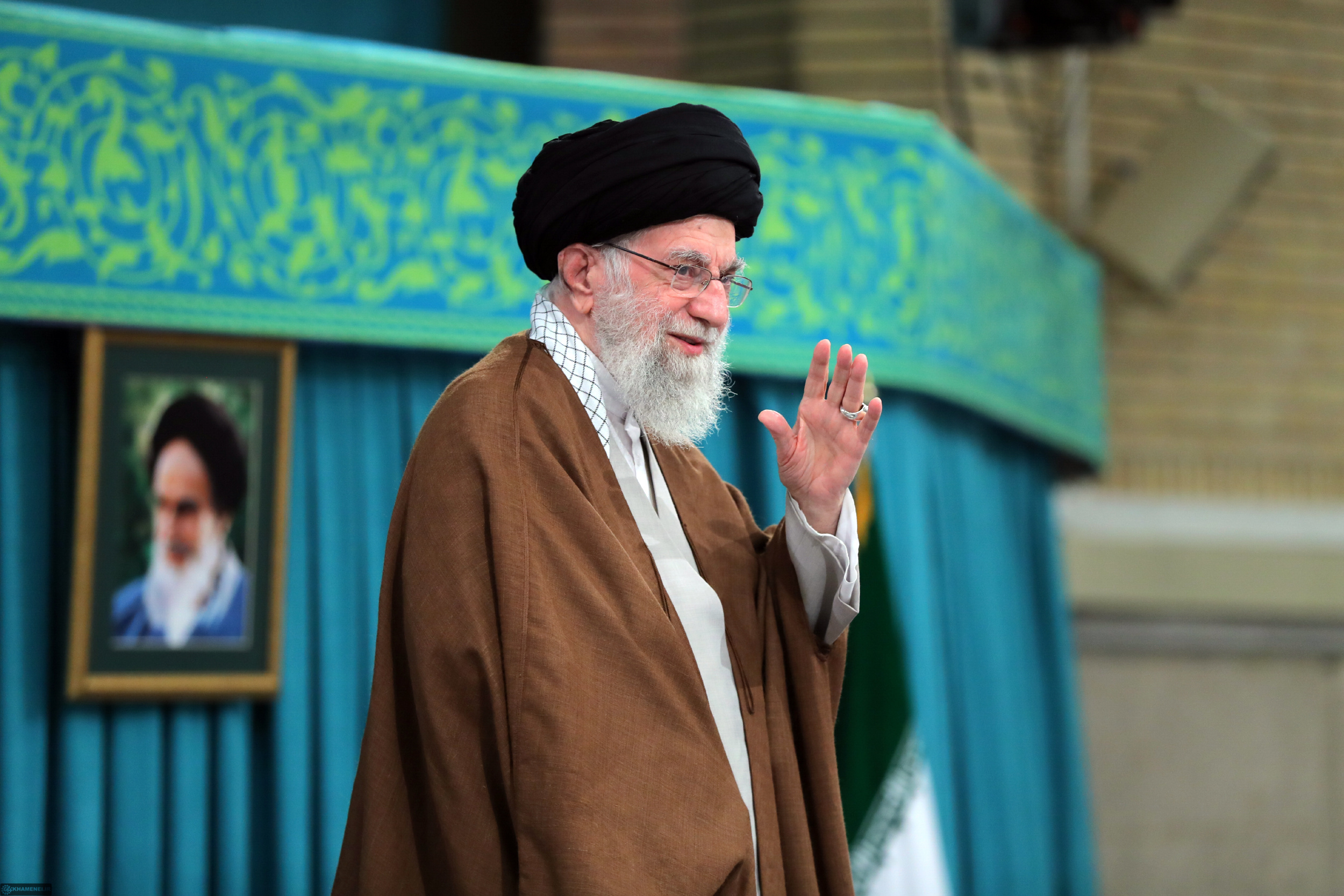

https://english.khamenei.ir/
https://t.me/fazylatha
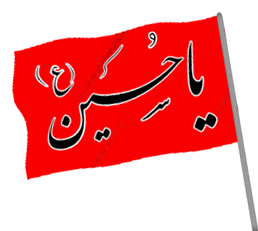
Note: All content is free to use
:: موضوعات مرتبط:
ولایت فقیه ,
شهید ,
دفاع مقدس ,
شهداء مدافع حرم ,
مسئله مهدویت ,
ظهور ,
نماز ,
حوزههای علمیه ,
حجاب ,
قرآن کریم ,
انتخابات ,
احادیث ائمه اطهار (علیهم السلام) ,
شهدای کربلا ,
محرم | عاشورا ,
شهدای انقلاب اسلامی ,
ماه صفر ,
اربعین حسینی علیه السلام ,
ماه مبارک رمضان ,
قیام ۱۵ خرداد ,
,
:: برچسبها:
woman ,
Hussain ,
Who is Hussain ,
The Authentic life of mankind in this world ,
Arbaeen ,
Imam Mahdi (pbuh) ,
Imam ,
Imam Hussein ,
era of Imam Mahdi (pbuh) ,
Karbala ,
Ashura ,
Zaynab ,
Zaynab al-Kubra ,
,
|
امتیاز مطلب : 19
|
تعداد امتیازدهندگان : 5
|
مجموع امتیاز : 5
|
|
 آمار مطالب آمار مطالب
:: کل مطالب : 797
:: کل نظرات : 0
 آمار کاربران آمار کاربران
:: افراد آنلاین : 1
:: تعداد اعضا : 0
 کاربران آنلاین کاربران آنلاین
 آمار بازدید آمار بازدید
:: بازدید امروز : 359
:: باردید دیروز : 0
:: بازدید هفته : 359
:: بازدید ماه : 12103
:: بازدید سال : 300478
:: بازدید کلی : 300478
|
